#and note by forcing Louis to either order him or refuse to order
Explore tagged Tumblr posts
Text
“But Louis has the power because of the Maitre dynamic-“ other than it being established that first time, the only times this power dynamic has clearly come into play, Armand has been the one to introduce it as an ultimatum.
“Are you asking, maitre?” / “Are you asking me or making me?”
Like Daniel said, only when it’s convenient, and he uses it to corner Louis into either imposing control or relinquishing it by presenting the question in the first place
#iwtv spoilers#interview with the vampire#interview with the vampire spoilers#iwtv#they fascinate me endlessly but it’s such a stressful dynamic to me#I could be misremembering but other than that first time on the bench#Louis has never leveraged the maitre title#until Armand prompts him to by asking if he’s taking on that role#and note by forcing Louis to either order him or refuse to order#he effectively removes himself from responsibility for anything
154 notes
·
View notes
Note
In that last episode where Louis introduces Armand as "The love of his life", I, personally, see it as a cry for help. He's looking right at Daniel and that tone he uses says "I'm saying this because he's standing right here and he's controlling me, he's controlling the narrative this time" and I wonder if I'm the only one who thought this and that, if I am, maybe it's because it's been 20 years since I've read the first four books and I need to go back and read them again... What was your take on that line and that scene?
So I think there could be a number of things going on here. I don't really subscribe to the idea that Armand is fully controlling Louis (on like a mind control level the way he did with Madeleine in IWTV) or his narrative, but it's clear he does exert some level of control over him. We can see this in the way he intervenes throughout the interview to calm/redirect Louis or end Daniel's line of questioning, how he editorializes Claudia's journals, and in the design of the book shelves in the library
(sidenote: I know some people say the book shelves are not evidence of Armand's control, but the same effect of Armand flying could have been achieved with floor to ceiling shelves. The fact that Louis is physically incapable of retrieving a book on his own and therefore must ask Armand to get that book for him if he wants to read means, even if Armand never refuses him or limits what he reads, he can say no and is in control of what and when Louis reads. We're very obviously meant to take this as a visual indication that Louis is at the very least dependent on Armand in a significant way)
It's also worth noting that Rolin Jones mentioned that Louis' version of events is perhaps a story he's been telling himself or has been told (presumably by Armand) in order to make his choices easier to live with, rather than the unadulterated truth that Daniel is after. I know Rolin's not a very popular guy right now, and for good reason, but the implication that Louis' memories have been influenced in some way, either by severe trauma or some external force, is important.
IF Armand is behind the faults in Louis' memory (which, again, it could just as easily be severe trauma), it's also unclear whether this might have been done out of selfishness to make Louis more detached from Lestat (which he evidently did not succeed at) or if Louis asked him to do it because there were things he wanted to forget. Obviously, the context of that matters a lot in how we interpret the final scene and it's kind of impossible to say until we actually know what's really happening in Dubai. With what we do know, though, it seems to me that there are two main possibilities wrt Armand controlling Louis and how it makes us interpret the ending
The first possibility is that Armand has been controlling Louis non-consensually, either with his powers or just good old-fashioned manipulation and gaslighting, and Louis is consciously or unconsciously trying to signal to Daniel that he doesn't want to be there anymore
The second--and most likely, in my opinion--is that Armand has been influencing Louis as we've seen it with his consent because for some reason Louis trusts Armand more than he trusts himself right now. That's not to say Armand hasn't done any shady shit, especially with Claudia's diaries, but it's possible that Louis is allowing him this level of control because on some level he genuinely does trust him to take care of him. In TVL, Lestat comments on how he was seduced by Louis' "staggering dependence," so it could be that Armand's dominating presence is a comfort to Louis even if to us it seems problematic. If this is the case, I think it's likely that Louis is trying to convince himself that whatever he and Armand have going on is the real deal even though he knows it isn't. He loves Armand, sure, but it doesn't compare to how he loved (and still loves) Lestat and that tension in Louis' smile is a reflection of how unsuccessfully he's trying to project and internalize the idea that Armand is the love of his life. This reading also lends itself to the Graduate-esque quality the ending is reportedly meant to have--Louis and Armand aren't right for each other, but that doesn't mean there's no love there at all
#interview with the vampire#armand#louis de pointe du lac#iwtv speculation#This certainly isn't an exhaustive list of what could be happening here but it's the best I've got rn lol#also I don't know exactly why Louis would want Armand in control of him like this but I'm hoping season 2 gives us some answers#like for all we know Louis has been having a depressive episode for the last (several) decade(s)#and Armand is just there to try to make sure he doesn't try to kill himself so he monitors him closely to try to keep him reasonably conten#like at this point it could be anything lol
78 notes
·
View notes
Text
Ugh, this article from Vanity Fair (copied below the cut for those of you who have run out of free articles for the month) about how many old Hollywood stars were forced into abortions to keep up their “images”—with some of them being absolutely destroyed by the procedure—is absolutely horrifying. How anyone can look at this and not see how these poor women were abused and manipulated is beyond me.
Abortions were our birth control,” an anonymous actress once said about the common procedure’s place in Hollywood from the 1920s through the 1950s. While patriarchal political powers connive to block women’s legal access to abortion in 21st century America, in Old Hollywood, abortions were far more standard and far more accessible than they often are today—more like aspirin, or appendectomies. How and why did a procedure that was taboo and illegal at the time become so ordinary—at least, among a certain set?
Much like today, in Old Hollywood, the decisions being made about women’s bodies were made in the interests of men—the powerful heads of motion pictures studios MGM, Paramount Pictures, Warner Bros., and RKO. As Aubrey Malone writes in Hollywood's Second Sex: The Treatment of Women in the Film Industry, 1900-1999, “If you want to play in this business, you play like a man or you’re out. And if you happen to be a woman, better not mention it to anybody.”
From the very infancy of America’s film industry, abortions were necessary body maintenance for women in the spotlight. Birth control, including prophylactics, were about as new as “stars” themselves—movie performers who went overnight from being “Little Mary” or “The Vitagraph Girl” to “America’s Sweetheart” or “Sex Goddess.”
“These newly wealthy men and women didn’t know how to control their money, their bodies, or their lives, spending, cavorting, and reveling in excess,” writes Anne Helen Petersen in Scandals of Classic Hollywood. In the working environment of the Hollywood studio system, society’s 19th-century sexual segregation had fallen away. Women—flappers, It girls, sirens and seductresses—were spared their destiny in the kitchen, and for the first time, they earned large incomes they could spend on whatever and whomever they wished. Many believed the publicity they read about their own erotic powers, and they went toe-to-toe professionally with men. Sparks were bound to fly.
And so it became necessary for the studios to implement reformatory measures to prevent stars from destroying their value through scandal. In 1922, Will H. Hays Hays collaborated with studios to introduce mandatory “morality clauses” into stars’ contracts. Consequently an unintended pregnancy would not only bring shame to these top box-office earners—it would violate studio policy. “[I]t was a common assumption that glamorous stars would not be popular if they had children,” writes Cari Beauchamp in her book on powerful women in Old Hollywood, Without Lying Down.
These clauses may have extended to an actress’s right to marry. According to Petersen, rumor had it that “Blonde Bombshell” Jean Harlow couldn’t wed William Powell because “MGM had written a clause into her contract forbidding her to marry”—a wife couldn’t be a “bombshell,” after all. When Harlow became pregnant from the affair, she called MGM head of publicity Howard Strickling in a panic. Shortly thereafter, according to E.J. Fleming in The Fixers: Eddie Mannix, Howard Strickling and the MGM Publicity Machine, “Mrs. Jean Carpenter” entered Good Shepherd Hospital “to get some rest.” She was seen only by her private doctors and nurses in room 826, the same room she had occupied the year before for an “appendectomy.”
In the 1930s, vamp and man-eating thespian Tallulah Bankhead got “abortions like other women got permanent waves,” biographer Lee Israel quips in Miss Tallulah Bankhead. When virtuous singing sensation Jeanette McDonald found herself pregnant in 1935, MGM studio boss Louis B. Mayer told Strickling to “get rid of the problem.” McDonald soon checked into a hospital with an “ear infection,” according to Fleming’s The Fixers.
Many of these Silent Sex Goddesses either fell victim to their own hedonism, fell out of favor, or burned out, such as Theda Bara and Clara Bow. Others, like Joan Crawford, kept going. Kenneth Anger writes that Crawford was a “gutsy jazz baby” who marched through the “twin holocaust of the Talkies/Crash unscathed” to escape her dirt-poor origins. “Joan knew where she came from,” he continues, “and did not want to go back there.”
Get 1 year for $15.Join Now In 1931 Joan Crawford, estranged from her husband Douglas Fairbanks Jr., became pregnant with what she believed was Clark Gable’s child and Strickling arranged for an abortion. Rather than reveal the truth, Crawford told Fairbanks that during the filming of Rain on Catalina Island, she slipped on the deck of a ship and lost the baby.
Crawford’s rival Bette Davis also willingly chose to have abortions for the sake of her career. Davis was the breadwinner for her entire family—her mother and sister, and her husband, Harmon Nelson, whom she married in 1932. If she’d had a child in 1934, she told her biographer Charlotte Chandler in The Girl Who Walked Home Alone, she would’ve “missed the biggest role in her life thus far”—that of Mildred in Of Human Bondage, which earned Davis her first Oscar nomination. Other great parts—“Jezebel, Judith, Elizabeth, Charlotte, and Margo Channing”—may not have followed, either. “But I didn’t miss any of these roles, and I didn’t miss having a family,” she said. Later in life, Davis had three children.
Her first child, Barbara Davis Sherry—known as B.D.—was born when Davis was 39. As biographer Whitney Stine notes in I’d Love to Kiss You: Conversations with Bette Davis, “she was proud of the fact that, after her abortions, she could have a baby at last and a career, because her mother had always insisted that she couldn’t have both. She never tired of reminding [her mother] that she could be a mother and an actress.”
“A child could wait; her career could not.” That’s the reasoning Jean Harlow’s mother gave about her daughter’s own abortion at age 18. Ava Gardner, too, expressed a similar sentiment when discussing her abortion, which she had when married to Frank Sinatra—unbeknownst to him. “‘MGM had all sorts of penalty clauses about their stars having babies,’” Jane Ellen Wayne quotes Gardner saying in The Golden Girls of MGM. “‘If I had one, my salary would be cut off. So how could I make a living? Frank was broke and my future movies were going to take me all over the world. I couldn’t have a baby with that sort of thing going on. MGM made all the arrangements for me to fly to London. Someone from the studio was with me all the time. The abortion was hush hush . . . very discreet.’”
But things didn’t work out quite so well for Judy Garland. Famous primarily for playing Dorothy in The Wizard of Oz and struggling to maintain both her weight and her image as an ingenue, Garland was never free to make her own choices.
“Married or not, the MGM girls maintained their virginal image,” Wayne observes, and this was especially true of Garland. In 1941, at age 19, she married the bandleader David Rose without the approval of MGM, and within 24 hours was ordered back by to work. When she became pregnant by Rose, her mother, Ethel, in cahoots with the studio, arranged for Garland to have an abortion. Audiences loved her as a child—not as a mother. In 1943, Garland became pregnant from her affair with Tyrone Power, according to Petersen. Strickling arranged for her to have an abortion. Arguably, these incidents affected Garland psychologically; eventually she became the first public victim of stardom.
Tyrone Power also got Lana Turner pregnant. Again, Strickling arranged for an abortion. Power was one of a constellation of male stars—such as Errol Flynn, Clark Gable, and Charlie Chaplin—whose unbridled dalliances left women paying the price, according to The Fixers. (The phrase “In like Flynn” alludes to Errol’s ease at bedding women—and his good fortune at being acquitted of statutory rape of two teenage girls.)
Strickling, who was by now referred to as a “fixer,” had his hands full with Turner. The “Sweater Girl” allegedly found herself pregnant by bandleader Artie Shaw in 1941, and Strickling arranged an abortion during her publicity tour of Hawaii. The procedure took place without anesthesia, on her hotel bed. Turner’s mother covered her mouth with her hand to stifle her daughter’s cries. A studio doctor, paid $500 that was then deducted from Turner’s paycheck, performed the procedure. A week later, she was back on set filming Ziegfeld Girl, according to The Fixers.
Some actresses struggled with whether or not to keep their child. Mexican screen siren Lupe Velez committed suicide in 1944 because she was pregnant by her lover Harald Ramond, who wouldn’t marry her. A devout Catholic, she declined to call “Doctor Killkare” (“the joke name for Tinseltown’s leading abortionist,” according to Kenneth Anger in Hollywood Babylon), and downed 75 Seconal instead, according to Hollywood Babylon.
The decision was equally tragic for Dorothy Dandridge. Otto Preminger had directed her in Carmen Jones and made her a star. When she became pregnant by him in 1955, he refused to divorce his wife and marry her. Dandridge was forced to have an abortion; the studio demanded it, according to Scandals of Classic Hollywood, not only because a child would compromise her image as the sexy Carmen Jones, but also because Preminger was a white man. And, while miscegenation laws were repealed in California in 1948, nationwide they were still very much in place.
Ironically, the rebel of her day was Loretta Young—not because she had an abortion, but because she refused to have one. A devout Catholic, Young journeyed abroad in 1935 to recuperate from a ‘mystery illness,’ after she found herself with child by Clark Gable under shady circumstances—and avoided the press. She gave birth to her daughter at home in Los Angeles. Young initially gave the child up for adoption—and then, a few months later, officially adopted her, according to The Fixers.
In the heyday of the Hollywood studio system, women were at their most desirable and their most powerful—but it still didn’t afford them the right to choose when it came to governing their bodies. Hollywood’s production codes extended to women’s reproduction. In the hundred years or so that have passed since the birth of American cinema, everything has changed—though, then again, perhaps nothing has.
18 notes
·
View notes
Text
On Bridling Dragons: The Essay
Do you like dragons, accurate world-building, and bizarre dental facts you’ve never once in your life wondered about?
Boy oh boy, have I got the post for you.
So everyone loves a good dragon-riding story, but as anyone’s who’s ever bridled a horse can attest, most artists (or writers for that matter) don’t know the first dang thing about that strappy thing that goes on a horse’s head, and that mess gets even worse when trying to translate it to a reptilian version of realistic working riding tack.
The basic and biggest problem in trying to bridle a dragon is the anatomical differences in the skull and dental types of equines (horses) and dragons (reptiles):
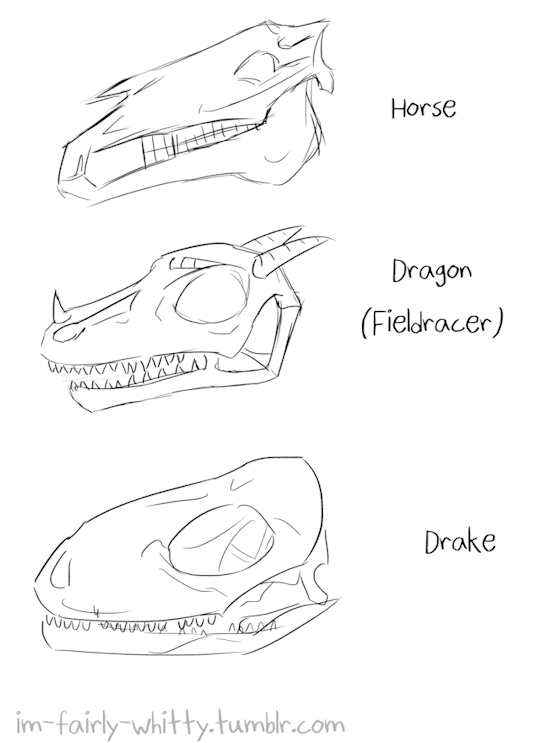
Horses are heterodont (mammilian, meaning they have different types of specialized teeth in their mouths) herbivores (plant-eating). They have their incisors at the front for cutting grass and then molars in the back for grinding it down. (Some horses also have small canines also known as “wolf teeth” up by their incisors that stallions use for fighting, but they’re small and generally ground down by their owners for safety.)
This herbivorous dental set-up leaves a convenient gap near the front of their mouths. That’s where the metal bit of the bridle sits, allowing the horse’s rider to turn the horse’s head by pulling on the reigns, which tugs the bit against the sensitive corners of the horse’s mouth and directs it.
But reptiles, and by extension dragons, do not have that gap for a bridle’s bit. While all mammals are heterodonts (again, meaning they have different types of specialized teeth in their mouths), reptiles instead only have one kind of tooth in their mouths that all serve basically the same small pointy purpose.
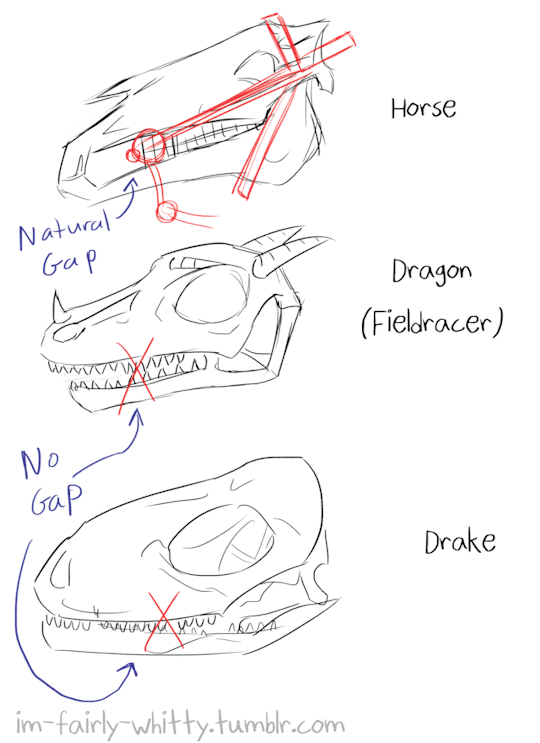
Most species of reptiles fall into one of three tooth types:
1. Acrodont, meaning the teeth are actually ridges attached to the jaw bone that do not grow back if lost (IRL chameleons, bearded dragons, and in this world small insect-eating wyveryns).
2. Pleurodont, meaning teeth are set inside their jaws and constantly fall out and grow back over and over through their entire lives (IRL many lizards and iguanids, in this world drakes are pleurodonts).
3. Thecodont, meaning teeth grow from deep sockets, the strongest type of tooth. Falls out and is replaced constantly but rate of replacement slows down with age since each tooth only grows back about 50 times. (IRL crocodiles and snakes, in this world dragons.)
Because of these teeth types there are two common strategies for bridling dragons (quick carnivorous flyers) and drakes (slower herbivorous and flightless).
1. Closed bridle:
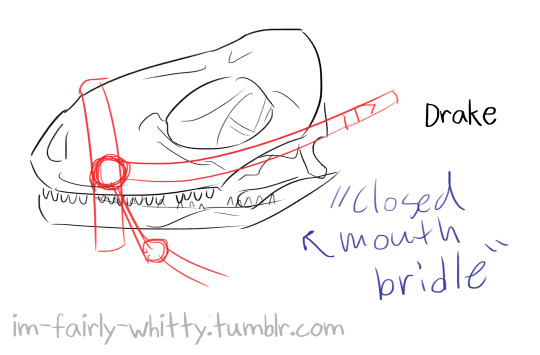
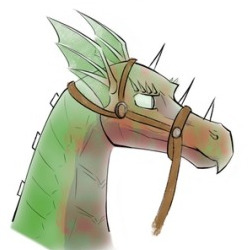
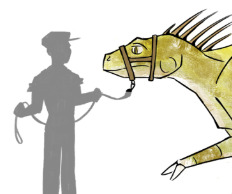
Meaning that there is no bit used at all. The mouth of the animal is strapped closed in a kind of muzzle while in harness. Riding closed bridle is actually legally mandated for many species of dragon that are known to be flighty, or that large enough that they could pose a danger around people if they were to be startled and snap at someone. Aside from that most dragons have necks long enough that they could reach around and bite their own rider if they were to get riled enough for whatever reason.
If a rider is caught riding open on a breed that should be wearing a closed bridle they are subject to very heavy fines for posing a public danger. Most drakes also wear closed bridle (the yellow drake pictured is actually wearing a simple lead halter) despite being easy to handle and calm, but that’s generally because they move slow enough that the kind of precise direction an open bridle gives isn’t needed and their teeth grow too constantly to remove for the second type which is the
2. Open bridle:
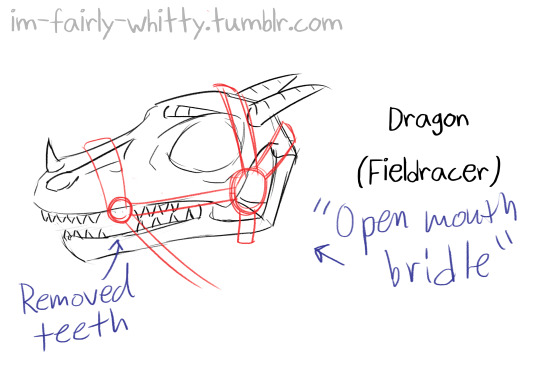
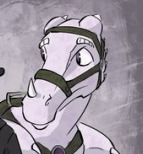
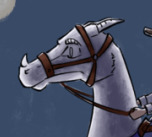
English Fieldracers like Arthur are one of the few species small and docile enough to legally be ridden open bridle, but that does come at a cost. Using a bit gives dragon riders better and faster control while flying, but it does necessitate the regular removal of teeth in order to create the bit-gap that horses have naturally.
While this is painful for the animal, it’s seen as a cosmetic sacrifice for performance, like IRL dog breeders who dock the tails or ears of puppies to meet breed standards or in order to make them better working animals.
A dragon’s “bridle teeth” are removed as often as possible while it’s still young before it’s bridle trained. This forced them to burn through the fifty or so times each tooth is able to regrow, meaning that by the time the dragon is fully grown at about 10-20 years old the bridle gap is permanent, the dragon no longer being able to regrow teeth there.
And yes open bridle teeth removal does become quite the animal rights issue in modern era timeline in the Free Wing universe, but for now Arthur’s one of the many Victorian Era dragons who’s just glad he’s old enough not to have to get his teeth pulled every few months anymore.
(Some more expensive bridles for younger dragons like Arthur’s use extremely tough types of leather through the mouth instead of metal in case of a surprise leftover tooth coming in. A surprise tooth that could crack very painfully on a metal bit will instead wear at the leather in a noticeable way that will allow the rider to get it removed before it’s an issue. Arthur really should be using a metal bit by now but he’s picky and Louis spoils him by buying the more expensive leather replacements when Arthur starts to chew through them since he can afford it.)
Extra note: Spanish Razorwing dragons (a cowboy’s mount of choice) are plenty big enough for them to legally be forbidden from riding open mouth, but many cowboys ignore this law since they want their mounts to be able to fight on a moment’s notice should they clash with bandits or feral dragons.
It’s a big risk to ride a Razorwing open bridle and generally the mark of either a very skilled or a very reckless rider. Many other cowboys will refuse to work with “open riders” because of the risk it can pose to their own closed bridle mounts who would be unable to defend themselves if the open bridle dragon decided to attack.
* also I realize now that Arthur’s reigns are absent or partially missing in his headshots and his bit circle is too high, I think that was a pre-research artistic decision in order to unclutter compositions since I hadn’t quite nailed down what I wanted dragon bridles to look like yet so I had some wiggle room.
#dragon#dragons#dragon rider#dragon riders#dnd#long post#free wing#my ocs#razorwings#fieldracers#arthur#worldbuilding#heck yeah science
337 notes
·
View notes
Text
Nice To Meet You - Chapter 1
Niall Horan x Sydney (oc)

PROLOGUE - CHAPTER 1: Lights Up
SUMMARY: Sydney knew that this job was something else for her, that it wouldn’t be as simple as it used to be with other celebrities. But she was ready to face it, and to face love too...
WORDS: 3.5k
NOTE: Okay, I love developing relationships and I’m probably into developing first a relationship between Sydney and Harry while only hinting something with Niall for the moment(even if I think that my hints are like PRETTY MUCH OBVIOUS but hey). Perrie’s introduction was like... Complicated. Because I wanted her to be supportive of Sydney, while knowing that she couldn’t fully trust her so yes... Ambiguous Perrie. But she’s love. I hope you’ll enjoy this chapter! 💕
DISCLAIMER: This story is all fiction and fun, I respect all the boys and this is just a piece of fiction out of my mind, all the relationships and events thay will be portrayed are fake (I mean, in the way I put them) and I know it. I don't want to harm anyone with this either so enjoy this writing or if it makes you uncomfortable I just not recommend you to read it. Love and peace and kindness to all of you 💕
TAGLIST: Leave a comment to be a part of it!
Sydney was nervous and tense. She could sense some shivers down her spine as she was sitting in the hallway waiting for Harry's manager to come out. Signing the papers was the first stage of their relationship, getting along was another, but it was the first time for her being introduced to his bandmates as what she actually was. A comedian playing a role, nothing else. Usually her clients were more keen on faking the relationship only between her and them, not sharing with anyone what truly linked them and why they were together. It was always easier for everybody once they had to split after a longer moment, but here it was a requirement of his management and Sydney couldn't refuse what they wanted. They were paying her on her terms and that was the least she could do in this very tricky situation.
She wasn't nervous because they were huge superstars, loved and supported by millions, but because they were five friends seeming to love and care for each other. She had studied them, one by one after she had signed the contract for good. She had looked them up on instagram, they all had nice feeds to look at and seemed to be pretty funny, and protective of each other on twitter. She saw the wars that had once occurred with another boyband, she saw the love poured on them and the love they poured on each other. She saw the videos too and saw how happy they looked around each other, and how clingy they all were. Especially Harry, being the youngest of the group he seemed to be protected by others at the very beginning, then the tendency shifted on Niall. Niall, the Irish one, with his endless laughs and a smile going on forever. He seemed to have the ability to laugh for everything and anything, and most of the time when Sydney watched the videos she found herself laughing with him under her blanket while the boys were joking during interviews. They were all nice, but would they be nice to her?
“Mrs.Sydney,” a man asked and she looked up from behind her sunglasses with a little smile.
“Yes it is me,” she replied and the man invited her in the room.
She stood up, arranged her large bottle green sweater and entered confidently in the room, or faking the confidence that was leaving her body when she met all five of them. When she first put her eyes on the band, they looked as if they came straight from the cover of a magazine. All their eyes were on her, severe and cold. She felt shivers again. She was absolutely impressed by the men standing in front of her, and she truly believed that whatever she would do would be held against her. Harry stood in the middle, surrounded by, on his left, Zayn and Louis, and on his right, Liam and Niall. She felt like an intruder, and it was the first time she felt that way. Everytime she met her client it was in an intimate space where they could talk about everything and anything about their relationship, it was always away from their surroundings. But here, it was different and she thought she was ready, but she really wasn't. They were facing her, with their grave looks and their crossed arms – only Niall had his hands behind his back – and Harry stood right in the middle, like a child protected by his brothers. Sydney felt small and meaningless for a moment.
“So, boys this is Sydney,” the man that entered right after her said in a happy tone and the boys seemed to cringe a bit. They were uncomfortable, maybe as much as Sydney was, but at least they had each other. “She'll be around Harry for a moment, she's a professional.”
“Yeah, just like the ones before,” Louis said and the violence of his tone made Sydney feel a bit guilty, something she refused to be for a long time. But something about his voice obliged her to yield to the force of guilt.
“It happens sometimes Louis,” their manager said and brushed off the subject. “I'm introducing her to you so you know who this amazing lady is when she'll be around, and so you won't be surprised.” Sydney could see Liam roll his eyes as the man spoke. “So, Sydney, from left to right, Niall, Liam, Zayn and Louis, they are lovely lads really.” Louis coughed really loudly just after the man spoke. Will be nice, she thought.
“Nice to meet you all, I know it isn't common or may seem a little bit off but I'm very excited about working with you. I'm happy to be able to help.”
“Yes, the other one said the same thing too,” Louis whispered and his voice was immediately covered by Liam's.
“We're glad to have you here,” he said and Zayn nodded calmly while putting his arm around Louis' shoulders.
“Great great,” the manager said while clapping his hands and Sydney just thanked him internally because it was becoming very awkward for the six of them. “Now, all we need is to settle a version for our lovebirds' encounter,” he said and invited the boys and Sydney to sit on the sofa and the chairs that were disposed in the room.
Happily, the man exposed to all of them his story for the fresh and cute couple while Sydney sat far from Harry, who was still shielded by his friends. They saw her as a threat, and all she could have been asking herself was who hurt this man so badly. All Sydney knew was that she didn't want to be part of the team his friends were protecting him from. However, she carefully listened to their little made up love story that looked like a bad scenario from a romantic comedy, but they were her clients so she had nothing else to say. They met at a party and Harry texted her, they met afterwards and now they were a thing. All details were left to them to confirm and to work on, but the core of the story sounded as fake as it should. Sydney almost sighed, and caught Niall looking at her for a moment, but as soon as she laid her eyes on him, he looked at Harry. Sydney was about to lose it all, working in such an environment was about to not be as fun as she predicted it.
Being put under the spotlight that soon wasn't what she had expected in the very first place. She knew that her first appearance in Harry's life had to be big, but not that big. Not at a charity concert, not while being surrounded by this many people looking at her as if she was a complete stranger, without any proper introduction. This was probably the most stressful situation she has ever been put in during her small career, usually her clients were almost clinging on to her and showing her off to any living soul that wanted to hear about their little story and their new, loving and caring relationship. But Harry ran away as soon as she arrived, talking about some rehearsing. But he greeted her, which was already a big win on her side. He has been avoiding her for the past few days, and Sydney began to ask herself if she wasn't in a fake relationship with not him but his manager.
So Sydney wandered around, as close to the boys' fitting room as she could, looking as excited as she could and was, and somebody asked her what she was doing there and then she could pull out the Harry Styles card by asking them that she looked out for him and that she was a... Friend of his. The man didn't paid too much attention it seemed because he told her that One Direction were rehearsing right now and showed her how she could get to the stage where all the magic was happening. And with great enthusiasm, Sydney made her way through the hallways in order to see them sing. From afar, she heard some verse to “Story Of My Life”. She would lie if she said that song didn't move her even a little. The evolution they had gone through during the past four years was really awesome, going from singing teenage bangers to ballad-like sounds which really were pleasant to Sydney's ears. Their voices were truly beautiful and soft, carrying all the emotion the song needed to touch one's heart. And Sydney found herself drifting away, as she leaned on the barrier right in front of her, looking up at the boys singing and rehearsing their movements. When she finally settled down for a moment, it was Louis' turn to sing, his eyes closed, focused on the words he was about to say, and Harry right next to him with a faint smile on his face. His blue eyes were looking at Louis, with a kind of fondness she didn't see earlier, not in person at least. And when she began to question this fondness, a hand was put on her shoulder, making her turn around.
“You're Sydney, right,” a girl right behind her asked and Sydney saw Perrie Edwards, Zayn's girlfriend. She wasn't ready for this meeting, not at all, but she should have been. She just nodded shyly. “Nice to meet you, I'm Perrie, Zayn's girlfriend!”
“Nice to meet you,” she replied as Perrie shook her hand with the brightest smile ever, “I'm Harry's friend,” she stuttered as she didn't know how she should introduce herself for the moment, even to Harry's surroundings.
“Oh yes, the one Zayn talked to me about the other day,” she casually said and hugged her, with her chin resting on Sydney's shoulder to whisper: “I know, I'm aware of the situation. Don't worry, I'm not telling anyone.”
Sydney felt an adrenaline rush in her veins. This job was about to be the death of her. Perrie's smile reappeared in front of her, sunny and adorable. She knew that the boys knew, but she wasn't aware of the fact that their girlfriends could also know, and that began to become a bit problematic for her job. Maybe even a little more than problematic because the more people knew the less the secret was kept, statistics said so. And Sydney hated statistics for a reason. She just smiled awkwardly and Perrie took her by the hand, a genuine expression on her face.
“I'm going to show you around a bit, I know the place pretty much because I performed here, so at least you won't bore yourself to death out here while the boys are rehearsing.”
Sydney didn't really know what to do as she was dragged on an adventure on her own, with one of her fake boyfriend's bandmates, aware of the whole situation. She asked herself if Perrie was a good actress of genuinely a nice person because of the way she acted with her while knowing who she really was. Especially after seeing the boys' reaction to her irruption in Harry's life. Which was truly understandable, Sydney couldn't deny that. But Perrie seemed to sincerely show her around, joking about some places and even talking about her band, Little Mix, as if she had known Sydney for a long time. Was she playing around in order to give the people around some suspicion about her and why she was there as Harry's “friend”? If she was, Perrie had a beautiful career in hiding secrets and making things believable to the public eye, for a mere second Sydney thought what it would be like to be her stunt because it seemed to be a perfect person to hang out around during trying times like these. They shared some laughs, fake or not Sydney couldn't really tell, and talked about things and other and to be quite frank, Sydney felt comfortable around her, and maybe a bit bolder than intended because she dared to ask her questions about the relationship she was in. Something she refused to do for a long time, usually because nobody around knew, but if Perrie was just playing along, even if she was only in Harry's team, she would help her at least a little, just as she was helping here right at the moment.
“Perrie,” Sydney almost whispered, looking around in order to see if they were in a safe space and indeed the room they were in seemed to be that kind of place, “how... Well, how should I handle all of this?” Perrie immediately closed the door, inspecting if anyone was there and then she nodded to her to continue. “I mean, this is the first time so many people know what I'm doing, I mean so many people around the concerned person. And this is making the things difficult for me because... I try to be friends with him, or at least to make it pleasant and to not annoy him more than this situation is.”
“Well,” she sighed and leaned on the door behind her, “the boys really do love each other, and they won't let you approach Harry more than you should.”
“And this is what makes things difficult,” Sydney said and Perrie looked a little confused, “I know my boundaries, but I just don't want all of this to be painful for him, not to be just a 'girlfriend to show off' but to make him feel comfortable around me, something the guys are preventing me from.”
“You care a lot about him, don't you?”
“I care about him being comfortable, nothing more. It's my job to help him out from a difficult situation I'm not aware of, and I need to be able to not make a difficult time out of being his girlfriend like this. I want Harry to be happy, or at least to forget that it's all fake and just have fun while being with me, as platonically as possible, but as romantically as possible for the press.”
“You're the first one of his stunts to ask me how to make him feel happy and not 'what it is like to date a guy from One Direction',” Perrie admitted and walked towards Sydney and put her hands on her shoulders. “It's very nice, you're lovely. I'm going to talk with Zayn about it, and I'll keep in touch with you, alright love?”
She was playing along for the full time, Sydney thought but now she was seeing the true Perrie. At least, a little bit of her true self. She couldn't really tell if she was as open as she was at that very moment, but she knew that Perrie could think that she was faking it all, because they were other stunts, other girls around probably making it difficult for Harry apparently. It touched her to know that she was the first one to ask about him, and how to make the things the less awkward possible around him, and not only to want attention. It also made her sad thinking that other stunts weren't as considerate as she was, at least not the ones that Harry had known.
“Thank you Perrie,” Sydney whispered. It was the first time she could ask for help with her client, without feeling guilty, without feeling like cheating. And even if Perrie was doing it for the sole purpose of serving Harry's interest, it was nice that she was willing to help Sydney out.
“Thank you for caring for the boys' well being Sydney. Now,” she said and quickly took her phone out her jeans pocket, “I'm following you on instagram so we can keep in touch for all these things and how the discussion went with Zayn. Take this and type your username.” As soon as she got Perrie's phone, she did as asked and gave it back to her. “Now, we need to go and have fun at the concert because you need to see what being a Directionner is like!”
She took Sydney by the hand again, and rushed her trough the hallways. At that very moment, Sydney knew that Perrie wasn't totally playing along.
When the lights went down, and she stood in the vip section during the concert, she could feel many eyes on her as Perrie held her by the waist and danced with her with a smile. What was even more surreal was hearing the fans behind them – Sydney didn't dare to watch all these persons crying and singing along. She felt the energy of the whole room being poured on her, the music, the artists, everything and even more. She let herself go a bit, enjoying the moment until One Direction's appearance on stage. They were properly introduced by the host, and the hall went silent after a ton of applause. She held her breath against her will for a moment, and then, the light illuminated the group. Harry stood at the very front, slowly making his way towards the edge of the scene, she noticed that he was shaking a bit. He was tense, and his jaw clenched until he began to sing. “Written on these walls are the stories that I can't explain” and then, he locked his blue eyes with hers for a mere second. Sydney couldn't really tell what all of this meant, but he winked at her. Almost secretly, but she was sure that the camera caught it, as well as her face while he did it: a total surprise as Perrie was swaying with her. Sydney was taken aback by this gesture, and Harry didn't seem to mind as he continued singing without even flinching. The circle of the boys moved, allowing Liam to be the one standing in front of the audience as Harry moved on the left. While being kept captive of this sudden change of attitude, she however managed to enjoy their performance. Perrie decided to stand next to her after a while, and Sydney could look at her and her loving looks when Zayn walked by, with a smile for her. They truly seemed deeply in love. From time to time, Sydney saw Louis smiling at Harry, for a mere second before looking at the audience again. His smile was bright and radiant, and so caring. But Sydney was mostly captivated by Harry himself and Niall. He had something special that didn't allow one to avoid his smile, his face and his blond hair. Syney's eyes were bouncing from Harry to Niall and from Niall to Harry, sometimes passing by Louis's smile. The atmosphere was magical.
And once they were done, Perrie grabbed Sydney by the hand in order to take her backstage to see the boys. With all of this rush, Sydney was glad to have someone by her side in order to guide her in the halls and through this hectic place. When they arrived, it was the time of the group hug and Sydney witnessed this magical moment with her own eyes. Harry, the tallest, was wrapping them with his long arms, holding tight onto Louis's sweater as the other boys were hugging each other too. And, while Harry's expression was the most relaxed Sydney has ever seen while being this close to him, he noticed her and immediately stopped the hug. And she felt like an intruder again.
“Guys, you were fantastic,” Perrie said with her enthusiastic smile and Zayn looked at her fondly.
“Thank you Pez,” he replied.
“Yes, it was a great performance I loved it,” Sydney said with a confident smile while still standing next to Perrie, whose hand was now held by Zayn's. She truly was an intruder.
“Great to hear,” Niall replied and his smile almost blinded her, so much joy.
“Happy to hear that, dear,” Harry said right after looking at his manager who stood right on his left. “It really means a lot to me to know that you liked it.”
She didn't feel like pushing the conversation further, because now she could sense how uncomfortable Harry was while speaking with her, even if she was standing there, still, not trying to hug him or to force anything. She could have, but she knew that all of this would be useless. Instead, she smiled and blushed as he said that. She wanted to seem cute, nothing more. She couldn't be clingy with him, not until they would become more comfortable around each other, and even the looks from his manager wouldn't make her do the move. She was the professional, he said it himself, and they had to cope with her ways of working if they wanted this relationship to work well and to be believable. And Harry smiled. It was probably the most genuine smile she had received from him since the very beginning.

#one direction#niall horan#niall horan x ofc#harry styles#zayn malik#liam payne#louis tomlinson#perrie edwards#pr stunt au
8 notes
·
View notes
Text
Heather Cox Richardson:
August 13, 2020 (Thursday)
Today was another one for the history books.
This morning, in an interview with Fox Business Network’s Maria Bartiromo, Trump came out and said it: he wants to starve the United States Postal Service to destroy mail-in voting. Claiming that mail-in voting favors Democrats, he said: “Now they need that money in order to make the post office work so it can take all of these millions and millions of ballots... Now, if we don’t make a deal, that means they don’t get the money. That means they can’t have universal mail-in voting, they just can’t have it.”
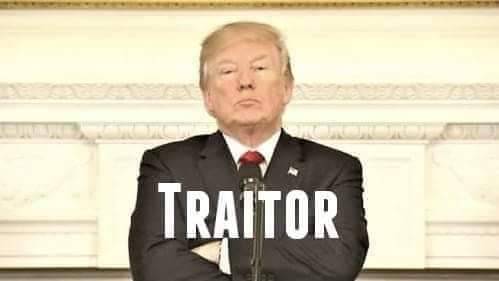
The president’s acknowledgement that he is deliberately sabotaging an institution established in the Constitution to steal the election provoked outrage. He is tampering with an election by attacking mail-in voting even as he and Melania Trump have requested mail-in ballots for themselves. And the USPS does not simply handle ballots, it also handles many aspects of our lives: packages, medicines, and so on—things vital to our economy and way of life. “When the president goes after the Postal Service, he’s going after an all-American, highly approved-by-the-public institution,” House Speaker Nancy Pelosi (D-CA) said.
The attack on the USPS dovetails with the push of the Trump administration to privatize the USPS, a push launched shortly after Trump took office. This week we learned that Trump’s new Postmaster General, Louis DeJoy, retains at least $30 million in holdings of the company XPO Logistics, a private competitor to the USPS, and that on the same day in June that he got rid of a large number of shares of Amazon, he bought stock options at a lower price. Amazon would be hard hit by the disintegration of the USPS. “The idea that you can be a postmaster general and hold tens of millions in stocks in a postal service contractor is pretty shocking," said former director of the Office of Government Ethics Walter Shaub.
But the bottom line is that, until the Senate decides to do something about it, the House is powerless to fund the USPS to help it survive the economic crisis sparked by the coronavirus pandemic. In the $3 trillion Health and Economic Recovery Omnibus Emergency Solutions (HEROES) Act the House passed in May, there was a $25 billion support for the USPS. But the Senate declined to take up the HEROES Act. When the Republicans could not agree on a new measure at the end of July, the Democrats began to negotiate directly with the White House, which proposed a more limited, $1 trillion bill. Democrats suggested a compromise at $2 trillion, but the White House has refused to budge. With this stalemate, Congress has gone on vacation for the rest of the month, while negotiators continue to try to reach a deal.
Representative Ted Lieu (D-CA) noted that DeJoy's new regulations are slowing the mail dramatically. He tweeted: “Here is the truth and I need you to spread it: the voters need to take control. Voters need to [vote by October 22] if using USPS.”
Other Democrats pushed back on Trump in their own way. In his interview, Trump said of New York Representative Alexandria Ocasio-Cortez, a Democrat: “AOC was a poor student. I won’t say where she went to school, it doesn’t matter. This is not even a smart person, other than she’s got a good line of stuff. I mean she goes out and she yaps.” Ocasio-Cortez retorted: “Let’s make a deal, Mr. President. You release your college transcript, I’ll release mine, and we’ll see who was the better student. Loser has to fund the Post Office.”
The admission he is sabotaging the post office was not the only piece of news in Trump’s morning interview. He made it clear that he is eager to have Attorney General William Barr counter the story that Russia intervened in the 2016 election in Trump’s behalf. Trump wants Barr to reach a different conclusion based on a new Department of Justice investigation. When it became clear that the DOJ’s own inspector general would conclude that the FBI probe of certain of Trump’s campaign advisors was begun legitimately and without partisan bias—as he later did-- Barr launched his own, separate investigation, placing U.S. Attorney for the District of Connecticut John Durham in charge of it.
This morning, Trump indicated he has great hopes that the Durham investigation will establish that former FBI Director James Comey, former CIA Director John Brennan, and former Director of National Intelligence James Clapper spied on his campaign and lied to Congress about it. “Bill Barr can go down as the greatest attorney general in the history of our country, or he can go down as an average guy,” Trump said, depending on whether or not he produced a report that, according to Trump, is not tainted with political correctness. “We’ll see what happens…. It goes all to Obama, and it goes right to Biden.”
The president’s campaign has also launched a full-fledged attack on Senator Kamala Harris, tapped yesterday by presumptive Democratic presidential nominee Joe Biden as his running mate. Trump and his surrogates say it is an “open question” whether she is constitutionally eligible to be president. This is a lie. There is no question that she is a natural-born citizen; she was born in California. Trump supporters are trying to argue that because her parents were not citizens when she was born, she is not a natural-born citizen, and is therefore ineligible for the presidency.

The Supreme Court answered this question definitively in the 1898 United States v. Wong Kim Ark decision. The Supreme Court evaluated the Fourteenth Amendment’s first clause, which says that "All persons born or naturalized in the United States, and subject to the jurisdiction thereof, are citizens of the United States and of the State wherein they reside." The justices decided the clause established that anyone born on U.S. soil is an American citizen regardless of the nationality of their parents.
The rather tortured argument the Trump campaign is making is that the words “and subject to the jurisdiction thereof” excludes babies born to foreign-born parents because the parents retain some legal ties to their former countries and are therefore not fully subject to the jurisdiction of the United States, so their babies must not be, either. This is hogwash. The distinction made in the Fourteenth relates to certain Native American tribes in this era, whose members were certainly born in America, but did not acknowledge the jurisdiction of the federal government and therefore should not, lawmakers thought, be accorded the right to vote. (The next section of the amendment names Indians explicitly, saying “Indians not taxed” should not be counted toward congressional representation.)
What’s going on with these blatant attacks on American democracy?
The Biden campaign pushed back on Trump’s attack on the USPS, saying: “This is an assault on our democracy and economy by a desperate man who’s terrified that the American people will force him to confront what he’s done everything in his power to escape for months – responsibility for his own actions.”

There is something to the idea that the president is desperate. Trump’s former lawyer and fixer Michael Cohen today released the introduction to his forthcoming book. It’s a doozy. Cohen claims Trump colluded with the Russians in 2016 to get a “major real estate deal in Moscow…. I know because I personally ran that deal and kept Trump and his children closely informed of all updates, even as the candidate blatantly lied to the American people saying, ‘there’s no Russian collusion, I have no dealings with Russia…there’s no Russia.’”
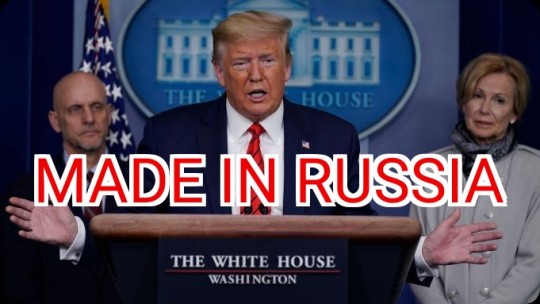
Cohen’s book, Disloyal, is due out in September.
Cohen says he set up a secret back channel to Vladimir Putin, “stiffed contractors on [Trump’s] behalf, ripped off his business partners, lied to his wife Melania to hide his sexual infidelities, and bullied and screamed at anyone who threatened Trump’s path to power. From golden showers in a sex club in Vegas, to tax fraud, to deals with corrupt officials from the former Soviet Union, to catch and kill conspiracies to silence Trump’s clandestine lovers, I wasn’t just a witness to the president’s rise—I was an active and eager participant.”
5 notes
·
View notes
Text
The Price Tag | Author’s notes
Seven million yen.
Seven million yen.
For seven million yen, Louis’ father had bought him from a Black Market livestock pen. He kept turning the figure over in his mind, looking at it from every angle his mind could devise. That was what his life was worth, what he was worth: seven million yen. Three years ago, his father had bought him for seven million yen, and taken him home to his new life. His only life—what he had before could not be counted: miserable and wretched, with its sole purpose being his inevitable death. This purchase price, he had gathered, was unique to him—it was not something he had in common with other children, outside the ones he had lived with. It was unusual.
He began to ask the nanny about the price of things. How much had his father paid for that car? What were the silverware worth? What had she given the cashier for the new clothes she’d bought for him? He could speak well enough to get these questions across now, although his speech was still slow and stilted, and he had to think a great deal about what he wanted to say before he marshaled the words in order to get them out properly. Sometimes, it was too exhausting to do it properly, and with Mara he would slip into something more casual and far less grammatically correct, but she had become talented at deciphering his meaning even then.
As they sat on the couch, watching TV—which had taken no time at all to become Louis’ favorite pastime (though, to the perpetual chagrin of Mara, he eschewed cartoons, in whose childish, low-stakes foibles he could find no entertainment, and continually sought out things well above his age range)—he asked her what his father had paid for it.
“I don’t know,” she replied with a small shrug. “This was here when I got here.”
“Yuta? Marion?”
“I don’t know if they know. Probably not,” she said. “Do you want me to look it up for you? Do you want me to find out the price?” Louis had been an odd fawn from the beginning, but if this harmless game of checking on the price of things was his latest quirk, she saw no harm in entertaining it. He nodded eagerly at the offer, and she took out her phone to take a look at similar TVs of the same brand. Louis’ attention abandoned the TV to watch Mara until she came up with an estimate. “It looks like—” Assuming Oguma-sama had picked the TV no more than a few years before Louis’ arrival, “—it was about eight million yen.”
Louis stared, then looked back at the TV. Eight million yen. The thing with which he spent so much time amusing himself; the thing which was his window into so much of the rest of the world; the thing which pleased him most in the house had cost his father more than he had. In a most curious sense, it was betrayal that stabbed through his chest, as if the TV itself had done him a wrong.
His hand curled up around the remote until the grooves of the battery cover dug into his fingers, and then he rose and hurled it at the wall with as much force as his skinny arm could muster. It burst apart, batteries flying out. He had meant to throw it at the TV, but he couldn’t quite bring himself to damage something so important to him, and he felt sure his father would not buy him another if he broke it. Perhaps if he broke something worth more than he was, Mara and his father would take him back to the livestock pen (this was not a genuine fear anymore, but he supposed the possibility always existed).
“Louis!” It was something of a marvel to him that he could still shock Mara in this way, although it was only brief now. Right away she was on her feet, striding over to shut the TV off manually. “What has gotten into you now?” she asked. “You don’t get to break things like that; you have to use your words.”
On his feet, Louis quivered, his breathing coming too quickly for such a tiny exertion. How could he explain to her, about the price? His father had sworn him to secrecy about the circumstances of his entry into the house, and even if he hadn’t, Louis simply did not have the words to spell it out. What words he did have were not only inadequate, they fled from his mind in the throes of his emotion and the harder he chased them the faster they ran, until he was left with nothing but the stunted, stupid grunting he had used to speak with the other livestock children.
His hands curled into tight fists and his teeth ground together as he frantically reached after his hours and hours and hours of speech therapy, trying to put together something to explain himself.
“Louis,” Mara said, gentling her tone. “Come on. Tell me what’s wrong; use your words.”
Mara, who tolerated his fits of temper and explosions of frustration that, to anyone else, were mere temper tantrums. Mara, who had told him time and time again that she was not his mother, and yet seemed to fill all the appropriate roles. Mara, who believed that he could use his words, and maybe someday would realize all she had was a dumb fawn more useless even than other children.
Louis’ eyes and throat burned, but he refused to cry. The keepers at the pen had no tolerance for it, and his father was not much impressed either. To cry over something so silly…no, he wouldn’t do that.
“I…” What did it matter, about the seven million yen anyway? His father had rescued him; was that not all that was important? Because of Oguma, Louis was going to live. Because of Oguma, he could speak at all. His father had given him a voice—it wasn’t his fault Louis failed to use it. His father, who had bought him to raise as his own son, who had plans for him, who believed he was worth seven million yen. And here he was breaking things like a fitful child and acting an idiot about it. “I can’t!” he burst out at last, trembling like a branch in a storm. He lifted his glassy eyes to Mara’s, his jaw working as he tried to come up with something more, tried to use his words, and came up dry. “I can’t!”
Louis lowered his head, waiting for the scolding, or the simple, quiet sigh of disappointment. It had been some time since Louis’ last fit over his inability to express himself, but it felt like they always wound up back there in the end. Sometimes, it was as if Oguma had just come too late, and Louis could not be salvaged. But it wasn’t fair! He worked so hard! He did everything his tutor asked of him, and more! And yet he still could not communicate as well even as children years younger than himself. Sometimes, he was relieved his father kept him schooled at home, so he did not have to open his mouth around other children, and let them know what an ignorant fool he sounded like (and he knew they thought that; he wasn’t a moron, and he knew when the children at the park or the playground or the pool were laughing at him).
Instead of scolding, or sighing, Mara came and knelt in front of the shaking fawn, and pulled him into a hug.
“It’s okay, Louis,” she said. “It’s okay.” With a soft whimper, Louis buried his face in Mara’s shoulder. “Take a deep breath, alright? Take your time.” Take a breath was one of Mara’s frequent pieces of advice, and one of the earliest he had come to understand, so it was almost by reflex he took a deep, shuddering breath at her direction, and felt his body start to relax again. She patted his back and sat back on her heels. “But you can’t break things when you’re upset, Louis. You know that. We’ve talked about that. No breaking things. That’s not okay.”
Louis shuffled his feet and stared at the floor. Be good, he thought. I can be good, for Mara. Never again would he be good for his jailers, just to stay out of trouble, but for Mara and his father, he would be good to earn their praise, to please them.
“I’m sorry,” he said.
“I know. I forgive you. Next time, if you can’t use your words, what will you do?”
“Take a breath.”
“Good. You will have to tell your father about this, you know.”
Louis cringed. His father had saved his life, and Louis repaid it by smashing things in a fit. Perhaps his father wished he’d bought #5 instead.
“It will be alright. Your father will forgive you too. But you do have to tell him.” Louis sighed quietly through his nose, and nodded. “Do you want to draw something?” Louis’ eyes flicked up to Mara’s without lifting his head, and he gave another quick nod. “Okay. Go clean that up, and I’ll get the crayons.” She gestured to the remnants of the remote as she got to her feet.
Later, when he told his father it was broken because he had stepped on it by mistake, Mara did not correct him.
5 notes
·
View notes
Text
“Greyhound” On Target: A Review Of Tom Hanks’ New World War II Naval Drama
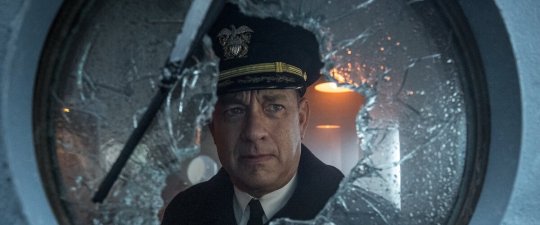
Coming on the heels of the successful 2019 naval epic “Midway,” Tom Hanks’ equally intense and exciting “Greyhound” is on target as it chronicles a harrowing 52-hour running battle between an Allied supply convoy’s escorts and a German U-Boat pack across a remote, undefended region of the North Atlantic during World War II.
The fictional story is set in February 1942 and follows the USS Keeling (DD 548), a U.S. Navy Fletcher-class destroyer codenamed “Greyhound,” and its captain, Commander Ernest Krause, as he leads a multinational escort fleet comprising his vessel, the two British destroyers Harry and Eagle, and the Canadian Corvette Dickie. Their mission is to protect the 37-ship Convoy HX-25 from Halifax to Liverpool as it runs the U-Boat gauntlet.

Greyhound was shot aboard the USS Kidd, pictured above.

The USS Kidd stands in for the fictional USS Keeling (Greyhound) in the movie.
This was a daunting task during that early phase of the war, with America having only entered it two months before with a small, unprepared navy and obsolete technology. The Keeling’s radar and sonar are balky, its window wipers freeze up, it’s low on fuel, and the warship does not carry enough depth charges for the job. Moreover, the wintry heavy seas of the North Atlantic are unforgiving, forcing Krause and most of his crew to fight on the Keeling’s weather deck and weapons stations while soaking wet and shivering cold. There is no air cover either since that part of the deep ocean was beyond the reach of Allied land-based anti-submarine aircraft. Naval planners formally named it the “Mid-Atlantic Gap” but sailors and merchant mariners simply called it the “Black Pit.”

An Allied convoy traverses the Atlantic in November 1942.

An Allied convoy crosses the Atlantic Ocean in the Tom Hanks movie.
While contending with the U-Boats, his ship’s limitations, and the environment, Krause himself also has to resolve an inner struggle with his personal frustrations, insecurities, inexperience, and even guilt in killing his German adversaries. In his forties, over-the-hill, and still a low ranking officer, he was the victim of the peacetime Navy’s practice of “fitting and retaining” competent officers by shuffling them from one administrative assignment to another during the 1920s and 1930s without ever assigning them to a sea command. Therefore, he is acutely aware that all eyes in the convoy are upon him since this is not only his first command but also his first combat crossing of the Atlantic.
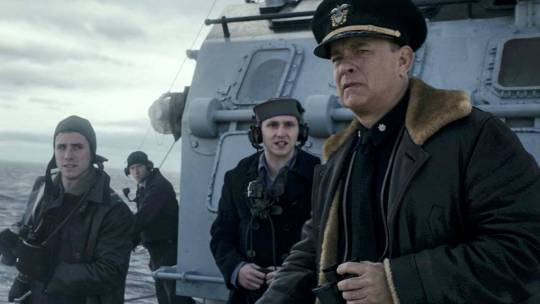
Krause is emotionally hurting too since, in an early flashback, his girlfriend Evelyn had refused to move from San Francisco to the East Coast with him and accept his marriage proposal. Her explanation that “the world has gone crazy” and that she wanted to wait until they “could be together” rang hollow. What she was really worried about was getting married and then quickly becoming a widow, which a heartbroken Krause understands and accepts. As a consolation, she then gives him a toy destroyer to commemorate his first command at sea and a pair of monogrammed slippers to remember her by.
Krause perseveres under these multiple burdens by drawing upon his devout Christian faith, daily prayers, and a handbill that he has posted on the mirror in his cabin quoting Hebrews 13:8 from the Bible—“Jesus Christ the same yesterday, and today, and forever.” Ultimately, Krause proves to be quick thinking, stalwart, and tactically brilliant, as seen during his first encounter with a U-Boat. Despite his problems, he falls back upon his training and intuition and successfully deduces his enemy’s circular dogfighting path to port, orders a rapid “right full rudder” to cut it off, and then destroys it with depth charges, much to the delight of his crew and British peers. While his men are celebrating their first kill, he takes no joy in his achievement, quietly mourning the deaths of the 50 German souls he had just sent to the bottom of the Atlantic.
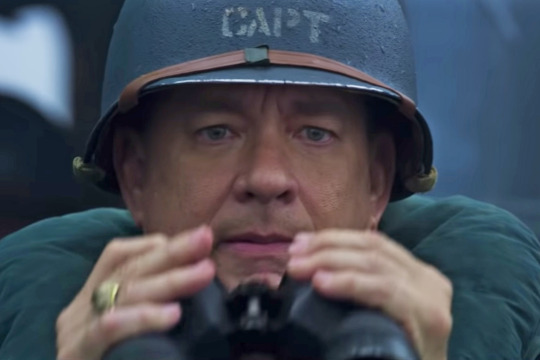
This was just the beginning of the Keeling’s ordeal. Over the next two days, Krause, his crew, and the other escorts fight an increasingly desperate series of engagements with the U-Boats, which penetrate the thinly-stretched destroyer screen and pick off several of the merchantmen as they cross the Black Pit. The lead U-Boat commander, calling himself “Grey Wolf,” taunts the Allies with blood-curdling threats and predictions of their doom over the open radio frequencies. “You and your comrades will die today,” the mysterious German skipper warns Krause in his final rant.
The Grey Wolf’s cat-and-mouse game with the Keeling is both deadly and personal but Krause eventually succeeds in his mission though not without loss. Sleep-deprived and exhausted, Krause runs his feet bloody raw during his non-stop scrambling back and forth across the Keeling’s bridge and weatherdeck. He can barely walk before the climactic battle with his nemesis and finally replaces his stiff leather shoes with Evelyn’s lined, warm slippers, not only easing his physical pain but also comforting himself with her virtual presence in the midst of combat.
Hanks’ story of Krause follows closely that of Cecil Scott Forester’s original character in the 1955 novel The Good Shepherd, right down to the sonar and radar bearings, the same orders, and the same combat maneuvers, blow for blow, against the same U-Boats. One notable difference though is that Forester’s Krause is named “George” and he is much more damaged psychologically than “Ernie” in Hank’s film. In the book George Krause suffers overwhelming guilt from a broken marriage, his wife’s infidelity, and their divorce, as well as the professional shame of a stalled career and passed over promotions. He also has to deal with the awkwardness of commanding more experienced crew members and Allied captains in the convoy.
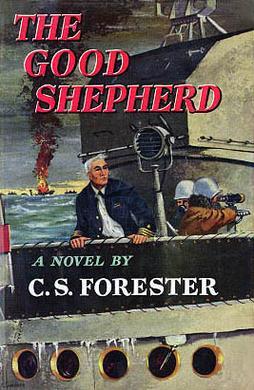
However, both George and Ernie reveal quiet inner strength that allows them to overcome their adversity and to win both their battles and the respect of their sailors. Each is “the man alone,” as Forester liked to call his prime characters, such as Horatio Hornblower, for whom the author is most famous. Indeed George and Ernie embody many of the introverted Hornblower’s traits, including his introspection, his dedication to duty, his discipline, his command brilliance, and his loneliness. Commander Krause is in effect Captain Hornblower in a World War II naval-setting, without the chronic sea sickness.
In his many books Forester (real name Cecil Louis Troughton) went to great lengths to portray his characters, their appearance, equipment, and customs and traditions in minute detail based on meticulous historical research. In 1943, the author was able to sail as a civilian aboard the Royal Navy light cruiser HMS Penelope as it patrolled the Mediterranean Sea. During that experience, he learned first-hand how a ship-of-war operated and made several key naval acquaintances who later served as advisors and proofreaders for his books, including the The Good Shepherd, as reflected in its exquisite accuracy.
Tom Hanks took Forester’s historical approach to heart in making Greyhound and consulted with Naval History Dr. Craig L. Symonds of the Naval War College and Marine Historian Gordon H. Laco to ensure that the film’s technical details and crew interactions and behavior were as historically accurate as possible. He toured the U.S. Naval Academy and filmed as much as he could aboard the USS Kidd (DD 661), the only remaining Fletcher-class destroyer still in existence in its World War II configuration, currently moored as a ship museum in Baton Rouge, Louisiana. According to Symonds, one point of contention was Hanks’ desire to portray a more familiar relationship with Mess Mate George Cleveland, a black sailor who feeds and looks out for his captain when not handling ammunition at his General Quarters gunnery station. Symonds told Hanks that this would have been impossible in the segregated World War II-era Navy which was dominated by hard-nosed, old school, class and race-conscious officers. Hanks resisted but Symonds insisted, so the producer met the historian half-way and split the difference in Greyhound, portraying Krause’s relationship with Cleveland as gentle but firm.
Other details are more authentic, from the uniforms and personal gear to the actual control knobs, lights, and wheels of the Keeling’s control panels and even its guns and their specific rates of fire. The burial at sea scene was also accurately done too, based on Navy regulations and customs of the period, which Hanks researched from the original archived manuals.
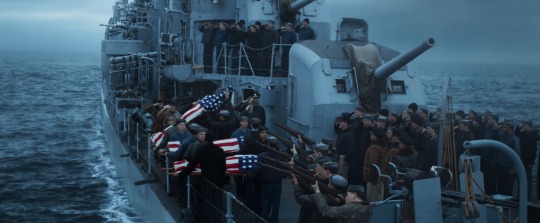
The shootout between one of Grey Wolf’s surfaced U-Boats and the Keeling and Dickie at mid-film is based on an actual close-quarters brawl between the Canadian destroyer HMCS Assiniboine and U-210 that occurred on August 6, 1942 while the Assiniboine was escorting Convoy SC-94. Both vessels had encountered each other by chance in the early morning mist and fog. Historian Gordon Laco described the action to USA Today, noting that “They were literally blasting each other with pistols, rifles, revolvers. The cook even came out of the galley and threw an empty case of Coca Cola bottles down the submarine hatch.”

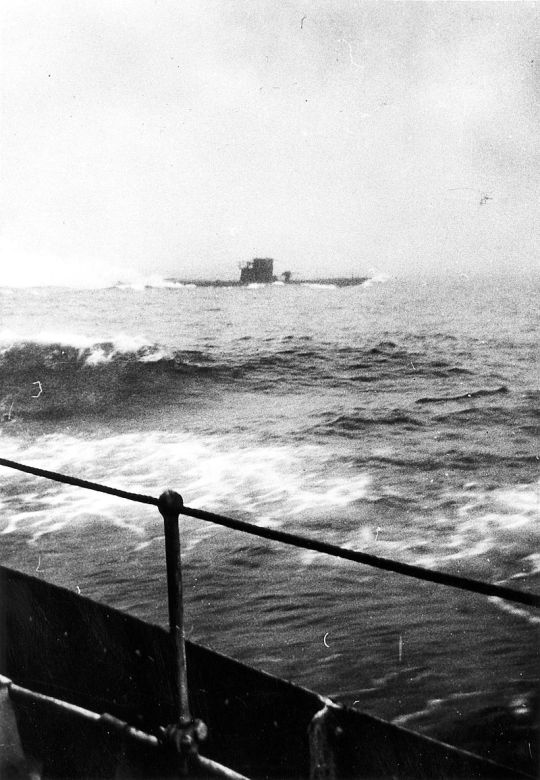
U-210 photographed from Assiniboine's deck, 6 August 1942
There are a few inaccuracies though that should be noted. The USS Keeling itself never existed, since destroyer (DD) hull #548 was canceled before construction, and the first of the Fletcher-class warships did not launch until May 1942, three months after the events of Greyhound. It would have been more authentic to show the Keeling as an earlier Mahan-class destroyer, as Forester originally wrote it, but the Fletcher-class was likely chosen by Hanks because of the availability of the Kidd in Baton Rouge for filming. Further, radar and sonar technology was not quite as advanced as portrayed in the film, even though the U.S. Navy had been participating in convoy operations since early 1941, with the USS Reuben James (DD 245) sunk by U-552 near Iceland on October 31 of that year.
And although the Type VII U-Boats were the most widely used of the war, with 703 built, generally they would not have fought Allied warships on the surface in broad daylight unless it was absolutely necessary, the chance historical battle between the Assiniboine and U-210 notwithstanding. Considering that a U-Boat’s chance of avoiding detection and survival was already slim, stealth was its key weapon and the darkness its ally, as was portrayed in 1981’s German film ‘Das Boot.’

German U-boat U-848 is attacked by a U.S. Navy Consolidated PB4Y-1 Liberator in November 1943.

A German U-boat is besieged in the Tom Hanks Greyhound movie.
Additionally, it would have been suicidal for a U-Boat commander to openly taunt destroyers on open frequencies as shown in the film and thus reveal their presence and locations. Forester did reference one instance in The Good Shepherd in which a British officer refused to send Krause an important message over voice radio because “Jerry’s been on this circuit more than once during the night. He has an English-speaking rating who chips in with rude remarks, and I wouldn’t like him to hear this.” This is undoubtedly the source of Hank’s plotline with the Grey Wolf’s rather childish howling, which is historically implausible, since German naval officers of the period were thorough professionals and considered to be the elite of the Kriegsmarine. They tended to follow Kriegsmarine regulations to the letter, which required strict radio silence while stalking and attacking convoys. The submarine profession is not called the “silent service” for nothing. Consequently, there is no historical record of such taunting ever occurring, even though there are a couple of recorded incidents of U-Boats “blinking” distant destroyers with their signal lamps after dark.
And while we do catch a brief distant glimpse of a brave U-Boat captain fighting his submarine from his conning tower and his crewmen manning its guns during the Keeling-Dickie surface battle, it is also unfortunate that Hanks otherwise chose to depict the Germans collectively through the disembodied, sneering voice of the Grey Wolf, particularly in light of their more realistic portrayals in previous classic films like Das Boot and The Enemy Below.
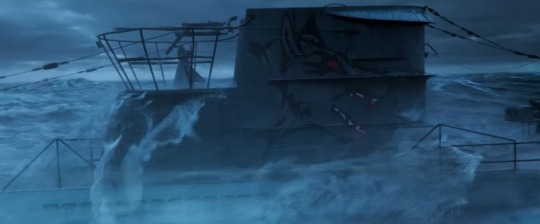
Those nitpicks aside, Greyhound is an excellent film depicting the often neglected “Battle of the Atlantic,” which was in fact the longest continuous and most complex military campaign of World War II, running from 1939 to 1945. British Prime Minister Winston Churchill himself later wrote that “The only thing that really frightened me during the war was the U-boat peril. I was even more anxious about this battle than I had been about the glorious air fight called the 'Battle of Britain'.” Indeed, 3,500 Allied merchant ships and 175 warships were sunk in the Atlantic, with 36,000 merchant mariners losing their lives, while 783 U-boats were sunk with 28,000 out of 39,000 German submariners perishing by war’s end.
Up to now, there have only been a few films focused on this crucial theater of the war, perhaps because it was previously difficult to capture its vastness and complexity before the advent of current CGI technology made it possible. Among the most notable from a surface warfare perspective are The Cruel Sea (1953) and The Enemy Below (1956), while submarines and submariners are the focus of Das Boot (1981), U-571 (2000), and In Enemy Hands (2004). And although current reviews of Greyhound are mixed, with many reviewers (perhaps spoiled by Midway) complaining about the film’s short length at 90 minutes and its lack of character development, and without any German voices except that of the generically evil Nazi Grey Wolf, they miss the point. The Allied navies and the merchant mariners they protected acted in concert as a team, and because of that “all hands job”, as portrayed in the 52-hour snap shot of Greyhound, the Grey Wolf howled his last howl, portending “Wolf” Hitler’s last howl four years later in April 1945. That too was an “all hand’s job.”
Working on your next award-winning documentary or binge-worthy historical fiction drama? Our team can help you create media so captivating your viewers can’t stop watching. How? By giving you the details you need to turn casual browsers into super fans. From screenplay creation, to costuming, to final review, SJR Research can bring immersive accuracy to your project every step of the way. You can browse SJR Research’s service on your site at SJR Research.
0 notes
Text
FoZ Notes 6
As I don’t expect to be online tomorrow much, if at all, I’ll be posting another Notes update to keep myself on schedule.
------------------
We finally meet Eleanore. Who is an older clone of Louise, but blonde like their father. She insists Louise should have a female attendant, gives no fucks about what the attendants (Saito and Siesta) are up to. [Reader note: Kissing et al]
Due to war conditions and insufficient officers for the army, Henrietta and company close the Academy down and recruit aristocrat kids to fill slots. Osmond and "one teacher" object, but are ignored. [Reader note: I’m pretty sure the ‘one teacher’ is supposed to be Colbert, based on later events. Though really, one teacher?]
Louis is all too honored to join the army... but the Valliere family objects for some reason? Eleanore is dragging Louise home by carriage for some reason.
Albion holds court on a round table of stone. Because Arthurian legend. [Future note: Never crops up again]
Cromwell wants to banish the whole "guy announcing people as they enter" thing because "none of us stands above the other!" (Says the Emperor...) [Future note: This mildly interesting bit of characterization has no relevancy and what it suggests about Reconquistador philosophy is never built on]
Gallia has declared itself neutral in this way... but Albion is trying to talk them into being willing to backstab Germania and Tristain. No wait, they were always Secret Allies of Albion, the defeat at Tarbes just wrecked the original plan to simultaneously invade Tristain. In fact, Gallia is the party that suggested they backstab when Albion is invaded! [Future note: Surprisingly, I don’t think this is a Surprise Plot Tweest the author just made up, as later events are startlingly consistent with this scenario. Could’ve been better set up/presented, though]
Cromwell can raise the dead... and that's all he can do. At least, out of "long incantations". [Future note: Again, he’s not actually a Void mage. He’s just using the Ring of Andvari. Which, by the way, can do other things, so he’s really lame]
Say hello to Zuko. I mean. "White Menvil". Also known as "the White Flame." He's almost parodically evil and killed his own family after dishonorable behavior got his title stripped because lolevil. Albion is hiring him because lolevil.
Cromwell wants Wardes to transport Menvil and a small squad to the Academy of Magic to take nobles as hostages. Never mind that the school is closed?...
... cut to the Academy, where the students are primarily female because the boys all volunteered to be officers. Er. What? Male teachers are gone, except Colbert. Tabitha didn't volunteer. Kirche did, but was refused because gender, though it's unclear whether they mean Germania or Tristain. Kirche views Colbert as a coward.
Ominous Foreshadowing involving a fire stone. [Future note: Wait what? Fire Stones get played up as this insanely big deal we only are now introducing several volumes down the line!]
The Valliere estate is so large there's a goddamn inn to wait at after half a day's travel! What, do they own a third of the country?
Eleanore is engaged. Doesn't like it. Louise is a moron who can't tell when her own sister is enraged, congratulates her. Oh wait she's furious because the engagement got canceled. 'kay. [Reader note: As far as I can gather, it got canceled because Eleanore is a bitch. Yes, Overlady’s presentation of her is more accurate to canon than you might think!]
Finally meet Cattleya. Also an older clone of Louise, only with identical hair color. Her carriage is filled with animals, including a tiger, a snake, a bear, and the more ordinary dogs and cats. Uh. How do they fit and why aren't they violent? In any event, Louise LOVES Cattleya's animals, while Eleanore is reluctantly tolerant.
Eleanore has a pocket watch. [Future note: You guessed it! Never crops up again. Not just hers, but in general we never hear about pocket watches]
Talking owl!! [Future note: Say it with me: this never crops up again]
Giant drawbridge golems!! [Complaint: what are the mechanics and limitations of golems, seriously, this is ridiculous]
Saito is allowed to be at dinner with Louise, but he stands behind her rather than getting a seat.
Sexism, Louise asserts, is "old-fashioned". Uuuuh. What changed, here in Halkeginia??
Eleanore knows about Louise being called "the Zero". Louise is unwilling to let her family know about her Void powers.
The Vallieres are one of the five biggest families of Tristain. [Future note: I still haven’t seen a reference to the other four]
Somethingsomething water magic doesn't work on Cattleya's illness because if you fix a part the degeneration moves elsewhere. "Various" medicines and magics are used to suppress her symptoms, instead. Cattleya can't go to the Academy or marry, as a result. She's supposedly never left the Valliere grounds. [Complaint: Water magic’s ability to fix or not fix things seems to have no even half-coherent system in mind beyond ‘whatever the author wants at this moment’]
The father is "retired". He is opposed to the war with Albion, on the basis that they should "siege" Albion instead, as they don't have a big enough numbers advantage in his opinion. He thinks the Tarbes victory has made Tristain overconfident. He disapproves of recruiting kids, too, claiming they're "useless" in war.
Then he places Louise under house arrest until the war is over. No leaving the castle. Louise ends up claiming her affinity is Fire, gets believed, told "same as your grandfather", a "sinful" element drawn to war. [Future note: This elemental stereotyping thing goes away after, like, the next volume] Ordered to pick a husband -which is interesting, actually. [Reader note: By that I mean I figured that the story would go Full Historical Sexist Mode and have Louise’s father pick out a husband for him, or perhaps demand she accept the overtures of an existing set of people attempting to court her we’ve never heard of before. Instead Louise’s father seems to be operating on the idea that, essentially, she can pick any male noble and be reasonably expected to have the proposal excepted even though she’s a woman and the usual thing is for men to be pursuers]
Cattleya magically knowing things because she's "sharp". [Reader note: Seriously, she just has magical insight/awareness for no real reason. How on Earth Halkeginia did she even develop this level of social insight if she doesn’t interact with people?]
In Tristain, at least, nobles were originally just people who swore they would give their lives for the princess. Riches and land were rewards... and the magicalness isn't addressed. Or at least that's how the Vallieres started, implying Louise's loyalty is a tradition in her family stretching back eons. Fits with the playmate thing.
Cattleya supporting Louise's decision in a sneaky way. [Reader note: She converts the drawbridge’s chains into dirt, so the bridge stays down and Louise and Saito can escape. Mind, this just raises all kinds of questions, as either castles shouldn’t be a thing if they’re so easy for a single noble to trivialize major components of the defenses or the Valliere estate ought to be benefiting from that ‘hardening’ thing we heard about back in volume 1. But noooo, consistency is unacceptable]
Louise uses Henrietta as a guidepost for behavior. [Future note: This... could be set alongside future events to point to as signs of Louise experiencing major character development, but I suspect ‘this never crops up again’ syndrome]
Royal Army, National Army, Sky Navy. Respectively: Mercenaries under the Crown's direct command (through nobles...), farmers levied by landed nobles, and the ships, the last of which... uh... work, somehow.
Guiche's father is Marshal of the Royal Army, because he's retired from military service. (??) Guiche has three brothers.
The students get two months of training.
La Rochelle's sky tree is called Yggdrasil. Shock.
The Air Navy promotes by merit, not birth. [Question: How do they choose who to recruit, though? We never find out]
After Tarbes, Tristain recruited some of the Albionese officers for the Sky Navy. This bothers a lot of the Tristainian airpeople. So much so that there are people plotting for "enemy fire" to kill these guys during combat.
Agnes home of Angleterre/Angle Province is, unsurprisingly, Albion immigrants who integrated into Tristain over time, but always tried to be independent and stuff. Twenty years before canon, roughly, they "forced" the Tristain government to recognize their independence and built a temple to, presumably, Protestantism. This pissed off Romalia, who promptly pressured Triustain into butchering them.
Not-at-all-coincidentally, a month before putting Agnes’ home to the torch, a Romalian New Religion noblewoman washed up nearby. Killing this woman was the reason people were there. The torching was claimed to be about preventing the spread of a disease, though the "New Religion Hunt" it was part of didn't last long due to changes in Romalian leadership.
Some De Poiters guy is blocking the Musketeers from participating in the invasion of Albion because he thinks they'd steal his glory.
Agnes trying to find out who the man who headed the torching/carried her out is so she can kill him. Stonewalled by the page naming him being ripped out of a book about a "magical research group". [Future note: We never get an explanation for this page being missing, I don’t think]
Trolls are as tall as five people. (25 feet?) They live in the northlands of Albion, and are apparently willing to be hired by humans to fight humans, though they're prone to ignoring orders and they hate humans for no clearly given reason. They just like killing humans. And fighting. They're basically Warhammer Orks, really. They have their own language and wield spiked hammers. [Future note: In the not terribly distant future the plot is going to go right back to ignoring the existence of what it calls ‘demi-humans’. Ugh]
Menvil thinks burning flesh is the best smell there is. Finally get confirmation on the obvious point that he was involved in torching Angletierre. Also learning the Magical Research Group actually DID do research -in between being called to suppress dissent and the like. And said research was focused on things like "how much damage does an AOE spell actually do?" and "burning flesh what happen?" Menvil got his Zuko-scar when he tried to attack the leader because he looked up to the guy. Even Menvil isn't sure why he attacked the guy.
Wardes has no soul. Fouquet can feel horror. Gender stereotypes. [Reader note: I forget what this was about, but basically Wardes feels nothing when doing horrific things and Fouquet actually does feel bad. You know, other than about stealing]
Mazarini is ALSO insisting that Tristain could starve out Albion. What, is Albion seriously running at a food deficit it resolves via trade? [Reader note: I didn’t note down the original claim that starving out Albion is a realistic possibility, because it’s dumb. No, the floating island is not a castle. It is, to all appearances, a self-sufficient land that grows its own food. Starving them out makes no sense unless they believe trade embargoes are a possibility, and even that is questionable since Albion apparently flies all over Halkeginia and so could simply trade for food from sympathetic countries when over them. And now that I’m thinking about Dumb Albion Things: why do we never hear about Albion blocking out the sun, or dumping literal rivers of water on the lands below it, or anything of the sort? It’s supposed to be flying overhead!]
Henrietta hates herself blah blah blah. [Reader note: For kicking off a war. Never mind that Albion started it when they tried to kidnap her with a goddamn zombie version of her lover. Nooo, she feels guilty because it’s totally her fault]
Louise is of the belief that sex should only occur after marriage, and only after three months at that, for nobles such as herself.
De Poiters gets entrusted with commanding Louise's Void magic in the invasion.
The story seems to be implying Dragon Knights are all people whose familiar is the dragon they ride?...
Osmond feels a war that takes women and girls lives cannot possibly be just. Agnes' response is "what justice does a war that takes only men's lives have", followed by saying that death is equal. He's got no response for either of these. Colbert freely admits to being a coward/afraid of war when called such by Kirche.
Demo airships. Uh. This seems like an incredibly bad plan. [Reader note: As in unmanned airships filled with explosives and then launched in the direction of the enemy to explode on impact. This is an actual naval thing, historically, but naval combat isn’t three-dimensional]
Raven familiars as an early-warning system. Sensible. [Future note: Later we find out there’s a low-level wind spell that can be used to get a birds-eye view of nearby locations. So actually not sensible]
Colbert invents magic-seeking missiles -as in, heat-seeking rockets, but chasing magic. Aaaargh. [Future note: The plot makes infinitely more sense if you assume Colbert is a Worm-style Tinker. Or Girl Genius style Spark. He’s ridiculous]
Illluuuusion magic. [Reader note: I... don’t remember what this was in reference to. Something stupid, that’s all I recall]
Ice spear reflecting off the Liar's Mirror to kill the caster. Really?
So if Agnes recruited the girls, why are they at the Academy?... [Reader note: Not sure why I didn’t note it down, but earlier Agnes came along and interrupted Colbert’s class to conscript all the female nobles of the school as soldiers. The implication is that they all leave to go be soldiers at Albion. Then instead the Academy is attacked by Menvil and everybody is at the Academy with no explanation or justification provided. I don’t think this is a failure of the translation, I’m fairly sure this is just one more way in which the author was incapable of being consistent on any level]
Menvil is actually blind, but somehow uses his Fire affinity to have omnidirectional thermal vision. Because shut up. Oh and Colbert is the ex-captain of the Magical Research Group. Because of course all this him-being-a-coward shit is so it can turn out he's a badass who saves the women. Because sexism.
Naturally, fireballs can be used to block other fireballs. Physics. And Colbert uses a transmutation spell to suck all the air out via explosion, instantly suffocating Menvil. Because that's how physics and biology work, right? (Wrong)
A number of "magic arrows" is too serious an injury for magic healing to fix without ingredients. Because drama trumps consistency. Let's have multiple girls faint from trying to fix Colbert! He's too beloved to die! Ugh. [Reader note: We’re supposed to find Colbert a likable, heroic figure, much like Saito. Also much like Saito, he’s nonsensical and not actually likable. Unlike Saito, he’s not a wannabe-rapist... because he used to be a mass-murderer! Classy]
End volume 6.
--------------
Surprisingly little horrible garbage of pointlessness! But a lot of dubious mechanics and inconsistent/probably inconsistent worldbuilding.
[In retrospect: No, there wasn’t much ‘harem shenanigans’, but this was still a horrible volume and all the Colbert-centric stuff isn’t even plausibly fanservice. It’s the author getting off on having his super-awesome regretful mass-murderer do a badass heroic thing and Prove Those Bitches Wrong for thinking he’s a cowardly wuss and have all of them feel sorry and bad for him now that he’s proven them wrong.
And the worst part?
He doesn’t stay dead]
4 notes
·
View notes
Photo

Mincemaker Yep. Jeanne was an illiterate peasant girl.
AdventZero That, and Marie Antoinette didn't even say those words. It came from Jean-Jacques Rousseau's autobiography which he supposedly quoted from a "great princess."
Marie Antoinette was 9 years old at the time Rousseau's books were written.
Farran TFW the Throne of Heroes gives all the basic knowledge of the world to a Heroic Spirit and still can't make her literate. Though on a more serious note, I thought that Jeanne as a Servant could read, she just still couldn't do math?
Mincemaker And you would think that if she did indeed say those words, she should be excused because she was 9 years old, for God's sake!
AdventZero Agreed. She wasn't even a princess back then, much less a "great princess" of her time. If my research is correct, Rousseau didn't even know she existed when his book was written. Marie Antoinette arrived in France until about 5 years after his first six books were written - at the age of 14.
That, and the saying was already a hundred years old by the time he quoted it in his book.
BarefeetChaser It is indeed a tragic case of somebody just make shit up, and some other people gets the shit for no good reason.
Kippenberger When did that myth first appear? It sounds like something Robespierre or someone petty would make up.
NWSiaCB In general, the wives/daughters of despised monarchs were roundly vilified in their day. To say something bad about the king was against the law, and being open about such things gave anyone within earshot who didn't like you all the excuse they needed to have you brought to trial and possibly even executed. Talk shit about the king's relatives, however...
The same can be said of Lucretia Borgia, as well, who gets a rap as the wickedest woman who ever lived because she's the daughter of one of the most corrupt popes to ever use the church as a bargaining chip for getting his son onto as many thrones as possible. Since he needed political marriages, and only had one daughter, well, why not just re-use his daughter by murdering or annulling any marriages that live past their usefulness and marry her off again? Who cares what she thinks about this, she's just a bargaining chip woman.
Then again, Marie Antoinette doesn't really have room to complain too much. If she's played as the genuinely innocent naive girl who was brought into a decadent court just before it collapsed, then it raises questions as to why she even qualifies to be a servant in the first place.
Kippenberger Marie in her earlier years was basicly an innocent naïve girl who's "restraing bolts" was loosend too early and as a result overspent her personal fund (money gained from taxing already suffering cevilians) more often then not.
While Marie in her later years started acting more mature, by then Robespierre and people with similar ambitions had gotten into a position to take avantage of those with even less commen sense then most versarien nobles - Yes that's possible - (such as Jeanne de Valois-Saint-Rémy) to stage a Coup.
Claverhouse Something continued with those poor wretches of pseudo-monarchs, presidents and such people: I have yet to come across an American First Lady not roundly abused by some screamers. And they are nearly all innocuous, rather dull women who have not interfered with their husband's work at all.
NWSiaCB Well, there's a gap between "some people" and "how history primarily remembers them". There are some partisans so fervent they loathe Laura Bush simply for being married to George W., but that isn't how the history books are written.
If you go back to First Ladies of more than a generation ago, the way history is handed down to anyone who didn't live through the moment leaves them only as historical curiosities if people know anything about them at all; a general whitewashing of history to heroify the likes of Jackie Kennedy, and a dismissal of Nancy Reagan's interest in the occult as a silly note of interest. As I stated before, the problem she has is "Let them eat cake!" is pretty much the ONLY thing most people know about Marie Antoinette. She wouldn't be noteworthy at all without it. (Hell, more people know who Marie Antoinette was than her husband who was the actual reining monarch of what was at the time the world's most powerful empire overthrown in the whole affair.)
Even worse, most portrayals of Lucrezia Borgia in anything that isn't trying to actively dispel the rumors of her life show her as a raging psychopath and incestuous slut who was willing to sleep with and/or murder (not necessarily in that order) anyone to make her otou-san or onii-san happy. (Of course, she has the misfortune of being related to the Pope so flagrantly corrupt that he's considered one of the primary reasons for the backlash against church corruption that led to the Protestant Reformation. Plus, he was also followed up by a Pope who loathed him with the blazing passions of a million hateful suns and overtly forced "confessions" under torture of Borgia servants to fabricate accusations of murder, adultery, and incest against a family already rife with rumors of those same activities.)
PraiseVectron To add onto that, Marie was an Austrian. Worse, she was an Austrian with the blood of the Hapsburgs in her veins. Nowadays, we don't really consider France and Austria to be arch-enemies, but the hate was intense back then. There were revolutionary politicians whose entire platform can be summarized as "we need to preemptively kill the Austrians before they kill us". Oh, and the Affair of the Diamond Necklace didn't help either.
In the Affair of the Diamond Necklace, Louis XV commissioned an intolerably expensive diamond necklace for his mistress, but died before it was finished. Louis XVI and Marie Antoinette refused to buy the necklace. During this time, a group of scammers had convinced Cardinal de Rohan that Marie secretly loved him and wanted him to buy the necklace for her using forged love letters. Cardinal de Rohan told the diamond makers it was for Marie when he bought the necklace. The diamond makers told Marie about the purchase, and Marie had them all arrested. While modern historians believe it was all the fault of independent scammers, the French public at the time believed it was all Marie's Keikaku. They believed Marie was an evil Austrian who wanted to destroy the romantic Cardinal de Rohan while receiving a decadent diamond necklace on someone else's budget.
Also, she was heavily involved the firing of Finance Minister Jacques Necker. While Necker would later be revealed to have completely failed to bring France out of debt, the French public believed Necker was the savior of the French budget. Necker used accounting tricks to hide problems in the budget, but when the truth was revealed during the revolution, the public initially blamed Marie's excesses instead of the "genius" Necker and his "perfect" math. When the truth finally came out, it was too late. Marie's reputation as a profligate was too large to be removed by something as silly as the truth.
As for actual faults during the revolution, Marie's only problem was being convinced that God would let them turn back the clock with no real consequences. Instead putting all their chips on the constitutional monarchists of the Feuillants Club, their stubbornness helped lead to the domination of the Jacobin Club and their own execution. This is no great fault of Marie's, since more worldly French nobles made the same mistake and gave the same advice to Louis XVI.
Kippenberger The idiot I mentioned (Jeanne) WAS the one who broke the camels back with the whole "Diamond Necklace Affair" Stunt. Didn't know about Jacques though. I know he was fired but not because of imcompetence. I THINK A documentary I watched - Can't remember which one - said it was because of something else but I don't remember what.
2 notes
·
View notes
Text
A Short Guide to the Alternate Universes of Impeachment
New Post has been published on https://thebiafrastar.com/a-short-guide-to-the-alternate-universes-of-impeachment/
A Short Guide to the Alternate Universes of Impeachment
If you’re looking at history to provide a guide to the impending impeachment saga … don’t. With only three past examples, involving three very different controversies, there’s thin gruel that will provide little nourishment. So let’s turn to a different tool: the concept of an infinite number of universes, where events play out in different ways, depending on everything from consequential decisions to random chance. Modesty forbids asserting that any of the outcomes listed belowwillhappen; only that theymight.
Some of these universes may seem improbable or even fanciful, I know. But before you dismiss them all, ask yourself this question: Would the universe we are living innowhave seemed any less fanciful three years ago?
Story Continued Below
IN UNIVERSE ONE
The House provides a forum for a deliberate look at a narrow set of facts. The template is the Senate Watergate Committee, which began poking into Watergate and other “presidential campaign activities” in the spring of 1973. It was a select committee of seven members, with nary an ideologue in sight. (Chairman Sam Ervin was a conservative Democrat; ranking member Howard Baker was a moderate Republican.) Over 319 hours, the nation learned of John Dean’s “cancer on the presidency” and the revelation that there was a taping system inside the White House. Notably, much of the questioning was done by staff counsel, which made for less political bloviation and more targeted inquiry.
So in this scenario, instead of having six committees channel their findings to the Judiciary Committee, Speaker Nancy Pelosi changes her mind, and creates a similar select committee, where staff lawyers do the lion’s share of the questioning, focused on the issue raised by the whistleblower: Did the president withhold desperately needed military aid to pressure Ukraine into damaging a potential political opponent.
In this universe, there is at least a chance of laying out the facts in a clear frame, enabling the public to grasp the essence of the case for impeachment. That in turn moves public opinion to the point where some Congressional Republicans begin to recalculate the benefits and cost of a pro-impeachment vote.
IN UNIVERSE TWO
Pelosi sticks to her original plan to have six (count ‘em six) committees feed their conclusions to the House Judiciary Committee. These committees are already investigating everything from Trump’s taxes to payoffs to mistresses to the origins of Trump’s wealth.
Judiciary itself is among the most polarized of Congressional bodies. Several Democrats have been pushing for impeachment, while Republicans on the panel include Jim Jordan, Matt Gaetz and Louis Gohmert, who devote much of their time to revisiting the “deep state” theory of an anti-Trump coup, as well as raising questions about the financial and personal travails of Hunter Biden. (Just Friday, Senator Tom Cotton and conservative columnist and talk show host Hugh Hewitt tweeted about a paternity suit involving Hunter Biden.)
In this format, barely controlled chaos is the order of the day. Witnesses either refuse to testify, or confront the Democrats with furious denunciations. (See the exchange between former ICE Director Thomas Hohman and Rep. Pramila Jayapal for a preview of what is to come.) The hearings feature each of the 40 members engaging in five minute soliloquies, ending in a party-line vote on impeachment.
As the committee descends into bitter partisan warfare, Trump’s media firewall goes to Defcon 1, with nightly, even hourly assaults on the Democrats’ attempted coup. And public opinion—which had been moving toward impeachment in the wake of the whistleblower’s complaint—now begins to swing toward “it’s the same old political noise” view. Trump’s job approval ratings stabilize, and when impeachment reaches the Senate, Majority Leader McConnell moves to dismiss the counts so that “we can get back to doing the people’s business”—meaning that there won’t even be a vote. (I know McConnell has said there has to be a trial, but he has never in the past been bound by consistency.)
IN UNIVERSE THREE
As the Judiciary Committee’s hearings provide a steady dose of ever-more damaging evidence—aided by an intelligence community and ex-White House aides turned whistleblowers,cracks begin to widen in the Republican-conservative firewall that has been protecting Trump from the 2016 campaign on. Mitt Romney’s “deeply troubling” view of Trump’s behavior, and similar comments by Senators Ben Sasse and Pat Toomey, persuade a handful of House Republicans—many of whom like Texas Will Hurd have already announced their retirements—to vote for impeachment.
Similar cracks widen in the media; the Drudge Report continues to feature damaging stories about Trump on its front page. At FOX News, the war between the journalists and the advocates intensifies; an attempted “debate” between Andrew Napolitano and Joseph diGenova turns into chaos, as the principals almost come to blows.
When impeachment comes to the Senate, after a contentious House process where there are divides among the Republicans, half a dozen GOP senators vote to convict, leaving Trump in office, but seriously damaged. In February, 2020, Trump barely wins a majority of votes in the New Hampshire primary, with New Hampshire native Bill Weld coming in second.
IN UNIVERSE FOUR
As the Judiciary Committee meets, the fortunes of Joe Biden begin to worsen as committee Republicans and the media—both right wing and mainstream—put the former veep into the spotlight. The lengthy, deeply reportedNew Yorkerstory from July about Hunter Biden’s troubled life gains new visibility, as do accounts of Joe Biden’s six-figure speaking fees and post-vice-presidential wealth.
By Thanksgiving Day, Biden withdraws from the race, and a muddled Democratic primary field heads toward a lengthy, divisive primary, with faint signs that Sherrod Brown, Hillary Clinton, John Kerry, Al Gore and Michael Bloomberg are “reassessing” their prospects.
Meanwhile, Trump’s approval ratings—as they have after every past controversy—stabilize in the low 40s, and the prediction markets peg his re-election chances at 50 percent.
IN UNIVERSE FIVE
As the evidence mounts against Trump, and the Judiciary Committee becomes the setting for a steady drip of damaging evidence against the president,he becomes more and more unmoored, launching into lengthy monologues about the spies and traitors inside his own administration. In response, onetime members of Trump’s administration—Jim Mattis, Rex Tillerson, H.R. McMaster—begin to express their concern about the president’s stability. As the president’s mental health becomes increasingly worrisome, a delegation including Sean Hannity, Laura Ingraham, Lou Dobbs and Rudy Giluiani go to the White House and urge that Trump resign. Trump orders them thrown out of the White House and Tweets a stream of accusations about backstabbers; he also urges all FOX viewers to boycott the network, and speculates that Rupert Murdoch may never have actually become a U.S citizen.
Those with long memories note that, during the last days of Nixon’s presidency, Defense Secretary James Schlesinger told the Joint Chiefs of Staffnotto execute any presidential order involving military force without first checking with him. Unfortunately, with no one in any semblance of authority at the White House or anywhere in the administration, there is no one to check Trump. The president’s effort to divert attention from his troubles results in armed military conflict in Iran, North Korea, the South China Sea and Venezuela. The year ends with the very real prospect of one or more of these conflicts “going nuclear.”
Read More
0 notes
Text
Heather Cox Richardson:
August 18, 2020 (Tuesday)
Trump today celebrated the 100th anniversary of the Nineteenth Amendment to the Constitution, protecting women’s right to vote, by announcing that he would pardon suffragist Susan B. Anthony, who was arrested in 1872 for the “crime” of voting. Scholars of suffrage note that Anthony would not want a pardon. “Anthony WANTED to be arrested and convicted and hoped to take her case all the way to the Supreme Court,” wrote historian Marjorie Spruill, “claiming that as a citizen, her right to vote was established by the 14th Amendment. However, because a well wisher paid her fine without consulting her, her case was closed and she was not able to proceed further through the court system. She was furious!”
Deborah L. Hughes, president and CEO of the National Susan B. Anthony Museum & House added that Anthony would oppose a pardon because it would give validity to a case she believed invalid. Hughes told Washington Post reporter Samantha Schmidt that the White House did not consult with the museum before deciding on the pardon.
That oversight might be because highlighting Anthony was designed to please a different audience than scholars and those excited about women’s participation in politics. Anti-abortion forces incorrectly see Anthony as one of their own, and claim her despite a lack of evidence she cared much about the issue at all. After appearing at Tuesday’s event at the White House, Marjorie Dannenfelser, president of the anti-abortion Susan B. Anthony List appeared at Tuesday’s event, then celebrated the “sweet moment,” because Anthony “fought for the rights of all, including the unborn.”
At the suffrage event, reporters asked Trump for his reaction to former First Lady Michelle Obama’s address last night at the Democratic National Convention, a speech widely seen as particularly strong. Trump’s response was a weird self-own that showed the degree to which he focuses exclusively on media and what will make him look best in a particular moment, with no longer strategy. He said, “Well she’s in over her head, and frankly, she should’ve made the speech live, which she didn’t do. She taped it. And it was not only taped, it was taped a long time ago, because she had the wrong deaths….” Trump meant that Mrs. Obama had cited the number of Americans dead from Covid-19 as 150,000, when the number is actually now more than 170,000. Not something one would think he wants to highlight.
Today Postmaster General Louis DeJoy, a Trump loyalist and mega-donor who imposed new rules on the USPS shortly after he took office in June, was forced to announce that he will postpone his overhaul of the USPS until after the election. Americans have been outraged over mail delays and the president’s announcement that his administration’s squeeze on the USPS was designed to hurt the Democrats in November by undercutting mail-in voting. DeJoy is facing Senate hearings on Friday, and House hearings on Monday. Lawmakers will undoubtedly want to hear why the Department of Veterans Affairs has had to go to private companies like FedEx and UPS to get medication to their patients, when previously, the USPS handled about 90% of all VA mail-order prescriptions.
But DeJoy’s statement did not address that, according to an internal USPS planning document obtained by CNN, 95% of the mail sorting machines marked for removal should already be gone.
Today the Senate Intelligence Committee released the fifth and final volume from its investigation of “Russian Active Measure, Campaigns, and Interference in the 2016 U.S. Election.” The bipartisan Senate Intelligence Committee is currently chaired by Republican Marco Rubio (R-FL), although most of the work in the report was done under Republican Richard Burr (R-NC), who stepped down as chair amid allegations of insider trading over information received in a classified briefing over coronavirus. This is a committee run by Republicans.
It concluded that there were extensive connections between Russian operatives and Trump campaign officials in 2016 that “represented a grave counterintelligence threat." Campaign chair Paul Manafort repeatedly communicated over encrypted channels with Konstantin Kilimnik, his Ukraine business partner who was also, the report establishes, a “Russian intelligence officer.” Manafort shared the campaign’s sensitive polling data with Kilimnik. The report also notes that Manafort consistently lied about his interactions with Kilimnik, and was willing to go to jail rather than tell the truth about them.
The report also established that the White House “significantly hampered” the committee’s investigation and coordinated stories before witnesses talked to the committee, and that there was “significant evidence” that WikiLeaks, which dropped emails hacked from the Democratic National Committee, was “knowingly collaborating with Russian government officials.” Document drops were timed to protect Trump from bad news stories, most obviously the tape of him boasting of sexual assault.
Despite their awareness of this material, Republican Senators refused to hear witnesses at Trump’s impeachment trial, and voted not to convict him.
In any normal year, the big news of the day would have been that today was the second day of the Democratic National Convention, held tonight with actress Tracee Ellis Ross as emcee.
Tonight was the business portion of the convention, and the business at hand was for Democratic delegates to nominate former Vice President Joe Biden for president. First, delegates entered into consideration two candidates: Vermont Senator Bernie Sanders and former Vice President Joe Biden (delegates for the other candidates have been allocated to either Sanders or Biden according to a complicated formula). There was much consternation when progressive Democrat Alexandria Ocasio-Cortez (D-NY) seconded the nomination of Sanders instead of Biden, but only among those who have not dealt with conventions: his delegate count required a nomination and it was an honor to hold a nominating slot. AOC explained with her usual style: “If you were confused, no worries! Convention rules require roll call & nominations for every candidate that passes the delegate threshold. I was asked to 2nd the nom for Sen. Sanders for roll call. I extend my deepest congratulations to [Joe Biden] - let’s go win in November.”
The DNC managed the nomination process virtually in clever videos from each state and territory that served as reminders that the theme of this convention is “We the People.” Delegates stood in front of iconic scenes from their states and told a little of their own history in a process that clipped along much faster than an in-person convention. The virtual trip around the country started in Selma, Alabama with a tribute to the late Representative John Lewis, then traveled around the country until Biden’s home state of Delaware claimed the honor of putting Biden over the top for the nomination at about 10:19 p.m. The new system was so well-received it would surprise me if it doesn’t become the norm.
The theme of the night was leadership. The first item on the list was health care. Progressive activist Ady Barkan, who is grappling with ALS and who first endorsed Massachusetts Senator Elizabeth Warren and then Sanders, recorded a powerful spot for Biden. Then former acting Attorney General Sally Yates, former President Bill Clinton, former Secretary of State John Kerry, and former Chairman of the Joint Chiefs of Staff and former Secretary of State Colin Powell, all endorsed Biden’s foreign policy chops.
The convention also highlighted rising Democratic leaders, and emphasized working across differences to build coalitions. To that end, Arizona Senator John McCain’s widow, Cindy, narrated a video recalling the friendship between Biden and McCain (R-AZ), implying that it was McCain’s friendship for Biden that led to McCain’s historic vote to buck Trump and save the Affordable Care Act.
Once again, though, it was the keynote that anchored the evening. Jill Biden’s earnest recounting of individual stories of community and love were a signal moment in U.S. history. They were a direct contrast to the vignettes of individuals crushed by the government that Ronald Reagan deployed in his famous 1964 speech “A Time for Choosing,” the speech that launched his national political career. Reagan’s vision of the world ushered in a world of toxic individualism; the vision of Dr. Biden, a teacher, offers to reclaim community and social responsibility.
Dr. Biden used the story of her life with Biden, surviving tragedy and rebuilding, as a metaphor for the country. She highlighted the good in Americans, and reminded that “we need leadership worthy of our nation.”





0 notes
Text
Expert: Disproportionate numbers of First Peoples are in Canadian prisons. Society arranges this fact to not seem that extraordinary. It could be argued that aboriginal peoples are political prisoners in North America, in or out of prison. Or that this is true for all minorities. Or that as the war on terror proceeds all Canadians may find themselves in a political prison. Privilege and prejudice are clarified when we note that aboriginal men and women damaged in government (police) custody are not often plaintiffs in trials for damages. And properly, this account would run to several thousand pages listing the individual cases of First Peoples’ imprisonment, rising out of a society which feels compelled to treat the education of, the medical care of, the social services for, the nourishment of, the housing of, the remuneration for, First Peoples unjustly. Unlike the U.S., Canada hasn’t used extreme long term incarceration of Indigenous leaders to discourage Indigenous movements’ protest actions. In the U.S. Leonard Peltier was sentenced to two life imprisonment terms for a crime he likely didn’t commit. Non-Indigenous U.S. leaders of the people such as the Kennedy’s, Dr. King and Malcolm X, were simply shot, and Canada’s historical icon of revolt Louis Riel was simply hanged. The many indigenous leaders in Canada maintain relatively low profiles and are more diffusely represented in these vast spaces of the land. Currently, the only group of Canadian political prisoners which approaches the length of sentences given U.S. political prisoners is Canadians who are Muslim.1 They have been treated poorly in domestic prisons or left to the dogs in the custody of foreign agencies. In some cases Canada’s security agencies seemed to be outsourcing torture for information. Of Canadian Muslims damaged in custody, Maher Arar was awarded 11.5 million dollars in an out of court settlement concerning the Canadian government’s responsibility for his torture in Syria. Abdullah Almalki, Ahmad El Maati and Muayyed Nureddin settled for about half of what each asked, 31.25 million apiece because of Canada’s assistance to the Syrian government in having them falsely arrested and tortured. Omar Khadr was to receive 10.5 million for Canada’s cooperation with the U.S. on Khadr’s incarceration and torture in Guantanamo while a minor. One lawsuit filed by Abousfian Abdelrazik, whom the Canadian government left in the hands of Syrian torturers, was settled out of court in 2017. In 2015 the Canadian government settled out of court a suit by Benamar Benatta whom it had turned over to the FBI as a terrorist suspect: he was imprisoned 5 years before they decided he wasn’t a terrorist. Daniel Ameziane, who sought political asylum in Canada from Algeria, is suing Canada for 40 million dollars2, after his torture in U.S. Guantanamo which he alleges was reliant on Canadian supplied information. and yielded the Canadians in turn information obtained by his torture (Ameziane, denied asylum in Canada, was subsequently arrested in Pakistan by a bounty hunter and sent to Guantanamo). The five Muslim men detained (arrested without charge) for varying lengths of time in extreme conditions, under the mechanism of Canadian Security Certificates, were not found guilty of any crime and have not, to my knowledge, initiated suits to compensate them for their arbitrary loss of rights, their suffering and the government’s attempts to ruin their lives. What is unusual about the Canadian persecution of Canadian Muslims is that they have some chance for redress in Canadian courts for severe violations of their human rights. Here I’ll try to update several cases Night’s Lantern has encountered in the past, and these of Muslims, targeted under the U.S./ NATO programs of the wars on terror and Muslim countries. The cases suggest a domestic application of an aggressive foreign policy which has the intention of corporate resource acquisition by force. Entirely ignored by the media is the case of Said Namouh who was arrested in 2007 and is serving a sentence of life imprisonment with parole possible after ten years (yet facing deportation if paroled). The charges against him were for participating in terrorist activities. But he committed no crime of violence against anyone.3 There was no evidence linking him to alleged bomb-making or making real the prosecution’s suppositions of active terrorism. The star witness against him was an Israeli CEO of a U.S. defense industry intelligence provider who analyzed Namouh’s computer hard drive. Namouh’s “crimes” were primarily of internet communication, personal declarations, extremist associations, in other words – his beliefs, convictions. This case puzzles innocents because it is entirely legal to have beliefs and convictions and it is legal to share them. In 2018 Namouh was denied his first application for parole; the parole board noted his record in prison wasn’t exemplary, and it wasn’t, but he didn’t try to kill anyone and he didn’t steal anyone’s dessert. The parole board (“La Commission des libérations conditionnelles”) isn’t likely to hear his case again until 2023. Yet there is a forfeit of the prisoner’s human rights and civil rights here, not because Namouh’s beliefs are unwise, unsafe, in some instances illegal, or against Canadian security interests, but because the punishment is the same as a mass murderer’s. He was in no way proven guilty of mass murder or any act of violence. His was a propaganda trial with a propaganda punishment. Another level of shame is reached in the more obvious injustices of Canadian Security Certificates. One recognizes Stasi or Gestapo tactics which aren’t Canadian practices, and the government has restrained itself from using the certificates since early in the new millennium. All five of the Muslim men arrested under Canadian Security Certificates back in 2000 to 2003 have been released from prison through the efforts of their lawyers in one trial after another. Despite government challenges Canada’s judicial system has safeguarded some of humanity’s progress since the dark ages. The government’s attempts to justify in court application of Canadian Security Certificates has cost Canadian taxpayers millions of dollars. Mohamed Harkat, former Canadian Security Certificate detainee, imprisoned without a charge against him in 2002, now lives at home protected from prison by judicial decisions, with his Quebec born Canadian wife of nearly twenty years. Their lives are under threat every day with complete disruption by the government’s continuing intention to deport him to Algeria, where it’s believed he is in danger of torture or death.((“Justice for Mohamed Harkat: stop his deportation to torture.)) Aside from the label of suspected terrorist assigned him by Canada’s security agencies, any refugee returned to Algeria is known to be at risk. In June 2018 Al-Jazeera reported 13,000 migrants left by Algeria in the Sahara desert within the last 14 months, subject to forced marches without water and food.4 The ordeal of Mohamed Harkat’s arrest without charges or public evidence against him has lasted year after year, placing him in prison, in solitary, on hunger strike, in house arrest with court ordered regimens, has subjected his wife to suffering and police abuse, subjected the family to legal expenses, debts, and charity without compensation. (Summary). If one wanted to inflict the conditions of a lasting torture on a family, either to obtain information or as one more threat to encourage the Muslim community to cooperate with government policies bordering on genocide in several Muslim countries, one might imagine inflicting on them the lives of Mohamed and Sophie Harkat. In a report to the UN Human Rights Council last Spring, Nils Melzer (the UN Special Rapporteur on torture) noted: “Whenever States failed to exercise due diligence to protect migrants, punish perpetrators or provide remedies, they risk to become complicit in torture or ill-treatment.”5 The injustices inherent in the government’s prosecution of a group branded the “Toronto 18” in 2006 by the press are less clearly defined and are difficult to explain. People are afraid to ask obvious questions about the group of minors and young men who were quite possibly guided into a horrible conspiracy by the several police agents among them to plan and organize a series of terrorist acts beyond the abilities of any in the group who weren’t police agents, to execute. As soon as early reporting of the arrests entered court, the judge placed a gag order on reporting details of the trial or revealing the defendants’ names. Portions of the ban protecting minors seem to remain in force. The mechanism has also provided a means to keep out of public scrutiny any low-profile informants and the role they played in a “conspiracy” which some of the defendants were unwilling to recognize. The alleged crimes the “conspiracy” was charged with were horrific and frightening, particularly to a population with misgivings about U.S. and Canadian wars against Islamic countries, crimes against international law, guilt from Canada’s role in “Operation Desert Storm,” the initial US and Coalition bombing of Iraq, the destruction of Iraq’s civilian infrastructure, depriving the country’s children of a future. By the time the US and its coalition invaded Iraq in 2003 Canada refused full participation. Canada’s commitment to fighting in Afghanistan may also be considered complicity in a war of aggression and a number of the “Toronto 18” expressed anger at Canada’s involvement in Afghanistan. So the script for the “Toronto 18” was noticeably muzzy, vague except in the allegations of dastardly plots and plans, and the curiousness that young Canadian citizens who were in other respects bright students and entrepreneurs could be manipulated into over-expressing their imaginations and feelings about injustice. In court eleven Canadian citizens accused were sentenced to prison. Charges against others were dropped or withdrawn. Of the accused, most just pleaded guilty. Four claimed their innocence but were convicted. Interestingly each case was different which one would not expect of a conspiracy. Charges relied heavily on the actions and testimony of a police informant (one is featured in official narratives) considered by some to have been a causative agent. The convicted did not have the knowledge or means to execute the terrorist actions they were found guilty of, and their actions required the professional help of the police informant(s). This troubled my own understanding of the case as it was revealed in the press, and the presence of this basic injustice may explain why post sentencing information about members of the “Toronto 18” remains scarce. The justice of their trials in 2009-2010 may be further questioned after a recent ruling in Vancouver BC which found the RCMP basically responsible for the terrorist acts committed by John Nuttall and Amanda Korody.6 The couple were recent converts to Islam and recovering drug addicts, guided into a terrorist plot and supplied the knowledge and materials to commit terrorist crimes by RCMP undercover. A three judge appeals court affirmed the decision of the lower court that the RCMP had basically entrapped the defendants, who were then freed. The RCMP’s case was found to be “a travesty of justice.”. To begin to gather then this disparate group of the “Toronto 18” I mention eight of the eleven who were found guilty and sentenced: Arrested when he was 18, Saad Gaya pleaded guilty in court in 2010 and was sentenced to 12 years in prison with pre-sentencing imprisonment of 3.5 years credited double. Gaya was to serve a remaining 4.5 years but was parole eligible in 18 months. However, the Crown was able to increase his sentence to 18 years. In 2016 the National Post reported he was granted day parole to attend graduate school.7 Mohamed Dirie convicted for weapons smuggling in the “Toronto 18” plot was sentenced to seven years including pre-sentencing time served. He was released in 2011, and is reported to have died fighting for “an extremist group” in Syria, 2013.8 Unconfirmed. Zakaria Amara9 pleaded guilty in 2009 to charges in the “camp plot” conspiracy and to charges in the “bomb plot” conspiracy. In 2010 he was sentenced to 21 months in addition to time served for the first, and for the second, life imprisonment. He was incarcerated in Quebec and eligible for parole in ten years. In 2013 the Supreme Court of Canada refused to review his sentence. Fahim Ahmad, sentenced to 16 years with double credit for pre-sentencing time served, was previously denied parole but will have completed his sentence and should be freed in 2018, according to The Toronto Star, and released early in 2018 according to the National Post. By 2019, I’ve found no notice of his release.10 Shareef Abdelhaleem who maintained that he “had no intention of causing injury or bodily harm” and asked the judge to sentence him as the judge would a white Catholic…, was sentenced to life in prison, and with pre-sentencing time included, was parole eligible in ten years. His father was an engineer with Atomic Energy of Canada who had posted bail for Mohammad Mahjoub, the Security Certificate detainee. The father’s implication in the “conspiracy” was attempted. Of his son, the prisoner, Wikipedia quotes him: “I am the last person to be a threat…this whole thing was staged to impress the public, to give them fear.”11 Steven Vikash Chand, a former Canadian forces reservist and new convert to Islam, was found guilty of participation and advising a financial fraud to assist a terrorist group. He was sentenced to 10 years including time served, yielding a release in 2011. Despite a recognized lack of serious involvement with the conspiracy group, Asad Ansari was sentenced in 2010 to six years five months for participating/contributing to a terrorist group, which amounted to time served. Like several others in the “Toronto 18” group, the government’s threat to withdraw his Canadian citizenship was canceled under a change in government and Royal Assent granted to Bill C-6 June 19, 2017. Saad Khalid pled guilty in 2009 to intending to cause an explosion and was sentenced to 14 years in prison including 7 years served. He was said to be radicalized in prison and the Crown increased his sentence from 14 to 20 years. These are long sentences in mens’ lives. This listing leaves three of the accused and found guilty prisoners uncounted, as well as the seven of those arrested and one way or another released. We can guess that most of those found guilty have by now served their time or reaching their parole date were quietly released. No one asks why children and young adults who were so normal in other respects leading the lives of innocents, imagined such horrific responses to their country’s crimes against innocent men women and children abroad. * “Canada and the politics of Islamophobia,” J. B. Gerald, February 5, 2017, nightslantern.ca. * “Guantanamo: Ex-inmate sues Canada for alleged torture,” Jillian Kestler-D’Amours,” November 10, 2017, Al-Jazeera. * “Pas de libération conditionnelle pour Saïd Namouh,” Louis Cloutier, February 7, 2018, TVA Nouvelles / MédiaQMI. * “Deported by Algeria, migrants abandoned in the Sahara Desert,” Victoria Gatenby, June 25, 2018, Al-Jazeera. * “Migration policies can amount to ill-treatment and torture, UN rights expert warns,” UN Human Rights Council, March 1, 2018, Reliefweb. * “B.C. Court of Appeal: Couple convicted in Victoria terror case entrapped by RCMP,” Amy Smart, Canadian Press, December 19, 2018, Vancouver Sun. * “Toronto 18″ convict granted day parole so he can go to graduate school,” January 1, 2016, National Post. * “Man convicted as part of Toronto 18 plot reportedly killed in Syria,” The Canadian Press September 26, 2013, Macleans. * “Bomb plotter sentenced to 12 years,” Michael Friscolanti, January 18, 2010, Macleans. * “Toronto 18 plotter reflects on a decade in prison,” Michelle Shephard, May 29, 2016, Toronto Star. * “Toronto 18″ member released on day parole in middle of 18-year sentence,” The Canadian Press, January 2, 2016, CBC. http://clubof.info/
0 notes
Text
what a wonderful man
As spring break approached, college life started to get the best of me. The night before I went home, I ended up crying on my best friend’s shoulder for about two hours, complaining that I felt that my life was out of my control, I wasn’t happy anymore, and things never seemed to go my way. I got caught up in the stress of what everyone expected of me: my professors constantly assigned work that I needed to get done by a certain time, my friends wanted me to go out and would not take no as an answer no matter how tired I convinced them I was, my parents had high expectations of me for everything I did and I refused to disappoint them, and my sorority told me to do numerous things a day that I would find time for no matter what. Simply, I felt like life expected too much from me, but the truth is that I expected too much from myself because I was trying to please everyone. Although I felt as though no one had been under as much stress as I was feeling in those moments, I know that there are millions of people, both alive and dead, that have felt my struggles. For instance, Louis Armstrong, the famous jazz musician, has a few things to say about the struggles I have faced; through my “communication” with him, I have learned that I am responsible for being in control of my own life, and I must do everything in my power to find the positives that keep me going daily, get rid of the negatives that do nothing but bring me down, and show this positivity to the world in order to be a good influence on others.
Every picture I have seen of Louis Armstrong since I have begun understanding his beliefs on how a person should be shows him with an absurdly large smile on his face while playing the cornet. If someone looks at this picture, they would have never guessed the lifestyle that Armstrong was born into, as his appearance makes him look as though he has not ever struggled a day in his life. However, the truth is actually the opposite. By the time Armstrong was eleven, he had already been living in one of the poorest neighborhoods in New Orleans his whole life, been abandoned by his father, been neglected by his prostitute mother, dropped out of school, been forced to work for a source of income himself and his extended family, and been arrested for ignorantly shooting a gun during a family celebration (“Louis Armstrong Biography”). Armstrong had had more traumatic experiences in his first decade of life than I have had during my nineteen years; however, he looks happier than I probably ever have. Why is that so? Armstrong has made me realize that the more one struggles, the more one understands life’s beauty. A person can either let traumatic experiences destroy them, or he can let them motivate him to do better, think more about the positives, and be grateful for the life he was given.
The reason that Louis Armstrong did not let all of the negative events in his childhood destroy him is because he found one positive that was worth more than anything: his passion for music. If all of the moments in his childhood never happened, he would have never been arrested, which meant he would have never been sent to the Colored Waif’s Home for Boys, which meant he would have never been exposed to the cornet, which became his entire life (“Louis Armstrong Biography”). Armstrong famously stated, “If you have to ask what jazz is, you’ll never know.” Jazz is improvisational, a group effort, and a challenge. It encompasses everything the “cool” stands for. Jazz is improvisational because the artists make the notes up as they go and play whatever sounds the best in the moment; a group effort because jazz requires an entire band to play or else it is not jazz; and a challenge because it is so much more difficult to play without a plan than play looking at sheet music but much more satisfactory to accomplish. Jazz music resembles the way a person should live their life to get a worthwhile experience: it should not be planned out by anyone, it should be spent with a good, small group of people, and it should be challenging in order to understand and be grateful for the good times. Armstrong understood this to be true, which is why he was so passionate about jazz music and why it made him so happy no matter what life circumstances he went through, and why a person cannot understand jazz music if they do not understand that this is how life works.
Louis Armstrong also encapsulates the “cool” ideal of living in permanent rebellion. Armstrong was married four times, changed bands six times, and moved cities and countries multiple times (“Louis Armstrong Biography”). Armstrong demonstrates that when a person is not content with the life they are living, they need to change something and leave behind the things that are holding them back from total freedom. Everyday I hear that people are “settling” and doing things that either their parents want or things that they think will make them happy in the future. A person with this mentality is living in the future and not focusing on how to get the most out of their life at the current moment. Armstrong demonstrates that a person must change now in order to gain freedom sooner; if one waits forever to make a change, it is never going to happen. Living in private rebellion means constantly changing one’s life in order to reach freedom, which Armstrong did through jazz. He states that a person must “never play anything the same way twice,” meaning that each change in a person’s life must bring something else, good or bad, to their life that they have never experienced. Private rebellion is challenging, whereas settling is much easier, but it is more satisfactory for a person to change constantly and discover more about himself.
One final lesson that Louis Armstrong teaches is that being a positive influence in the world can go farther than you think. Armstrong is most famous for his song “What a Wonderful World,” and when questioned by an interviewer on how he could be so positive in a world full of turmoil, he responded, “Seems to me it ain’t the world that’s so bad but what we’re doing to it, and all I’m saying is: see what a wonderful world it would be if only we’d give it a chance. Love, baby - love. That’s the secret.” Armstrong understands that dishing out hate in a world full of hate will get you nowhere; instead, dishing out love in a world full of hate can give just one person optimism to do the same thing. Everyone has their struggles, including Armstrong himself, but that does not mean our struggles must define us and cause us to be unhappy and angry at the world. Instead, our struggles teach us the beauty of love, the people around us, and the world in which we live. Being loving towards another who is struggling can make them feel better and give them hope for humanity in a world that does not have much. A person should never be hateful to another; love goes much further.
In conclusion, Louis Armstrong, who had a chaotic childhood, learned to take control of his life and his emotions and make something beautiful of it through music. He inspired people not be defined but to be empowered by their struggles because love goes so much further than hate. When a person is unhappy, do something to change it. When a person feels oppressed, do something to gain freedom. A person’s happiness and freedom is defined by one’s actions and how one views his or her world, and the only way to achieve it is to take ownership of one’s life. Be kind and loving to each other because everyone is fighting an internal battle. If everyone could learn a little on how a person should be from Louis Armstrong, then we could all think to ourselves, what a wonderful world.
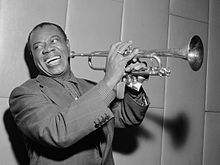
0 notes
Text
FoZ Notes 1
In part as an attempt to force myself to finish Familiar of Zero and move on to Twig, I’m going to be posting my notes to Tumblr, one volume worth of notes per day. I can read an entire volume in a day if I don’t put it off, it’s just so stomach-churning I struggle to make myself.
We’ll see if it works.
-----------------------
Familiar DETERMINES affinity. Interesting implications for crossovers. Though really it's probably more like "this is how we discover your affinity". Familiar runes take a minute to apply, uncomfortably hot. (Inconsistent whether it's "just a moment" or more on the order of a full minute) Occurs post-kiss. No explanation or justification is given for why Louise kissed Saito on the lips, rather than the forehead -I find it difficult to believe the ritual actually demands lip-to-lip contact, given some of the creatures being summoned. Louise is treated badly, openly, with authorities (Colbert, in this case) not interfering unless she pushes back. People essentially ignore Saito. Unclear if it's because he's a Familiar or because he's being interpreted as a commoner. Unclear why everyone assumes he's a commoner -how would they know he's not a mage? Louise finds it plausible Saito has never seen a few magical beasts, including griffons, by virtue of interpreting him as a commoner. Saito passed through a "sparkling mirror-like object", which was elliptical, floated above the ground, and had no thickness at all. He felt electrocuted passing through, though only mildly. Two giant moons. Louise is quick with the groinshot when Saito seems to be attempting to rape her. (Because Saito is a fucking moron) Claim that familiar contract is unbreakable. Skeptical. No commentary on whether the summoning step is too late on a physics level or just on a social level. On the social, unclear whether Louise was entrapped in general or only specifically by the fact that she'd failed repeatedly prior to summoning Saito. Louise is near-instantly convinced by a laptop. Never mind that it wouldn't be anything other than a glowy metal thingy to her, and never mind that she doesn't know all there is in the world to know... "I've never seen anything like this" she says about the glowy metal thingy. So? Proves nothing. Louise refuses to actually try re-doing the Summon Familiar spell. Cites reasons, ignores how the situation is extraordinary. Saito, being a moron, gives up instead of pointing out that if this is unprecedented they might as well try. Familiars' senses can be tapped. But not Saito's, because that would be too consistent. Inexplicably, Louise assumes that if Saito were to go home, she could summon a new Familiar, having previously insisted only death ends the contract. Possibly she's being dismissive or treating "going home" as a euphemism? Louise is disturbingly at ease with slotting Saito into the Familiar/property/object mental slot. I assumed the 'comfortable being naked around Saito' thing was some commoner/noble thing she was doing, but no, she's treating it like getting naked around a pet. Louise is quick to punish disrespect by withholding meals. Kirche has a Charmander. Flaming tail (which apparently proves it's from the Fire Dragon Mountains) and the size of a tiger. Constantly heating the area up, passively. [Note from the future: the story seems to essentially forget about her Charmander past the first couple of volumes] Oddly, dialogue implies Kirche knew her affinity was fire before she summoned her Familiar? Or just bad writing/translation. Brown/black/purple cloaks for first/second/third years. Louise and her peers are second years? Seems... odd, given the primacy of affinities. Why didn’t they summon as first years? [Note from the future: even though we only hear about three years, Louise is still in the Academy more than three years later into canon. Consistency, what’s that?] Familiars are barred from the main hall, at least during breakfast. Louise somehow requested Saito be exempted without him knowing, which seems wildly implausible. "Oh, Great Founder Brimir, and our lady, the Queen, we thank you for this humble meal that you have graciously provided us this morning," is said by all students, simultaneously, before breakfast. Somehow Kirche's Salamander can sleep underneath her chair, curled up. I thought it was as big as a tiger, minimum? Floating eyeball creature=bugbear. (??) Teacher Chevreuse is an enabler of people being horrible to Louise. As per the first teacher (Colbert), she only intervenes when Louise fights back. She at least does punish people for giggling when a student insists that Louise really is a "Zero"... The "basics" of Earth is transmutation. Not manipulation of the dirt or whatever, alchemy. Chevreuse has never worked with Louise before, and strangely is unaware of her explosive results. Just heard of her being a "hard worker". Inconsistent as to whether chanting is necessary or just "concentration" for running spells. [Note from the future: it gets worse. So much worse] Headmaster Osmond is irreverent. He's basically Perverted Straight Dumbledore. Saito is a dumbass asshole and now I know why he sees nothing wrong with how Louise is treated. Oh god. The author wants us to think Saito being an asshole is somehow noble, too. "Nobody" has been "kind" to Siesta the maid since she showed up at the castle. Saito being grateful for eating at all is some giant shock that causes her to burst into tears, because this is such a pleasant world you see. Saito hopes Guiche would just die, because he views the boy as a horrible narcissist. Glares of death, etc, leading all the way up to getting into a fight with the guy and refusing to back down. This is particularly horrible because Saito isn't exactly holding himself to monogamy on any level, so his loathing of Guiche is basically either hypocrisy or an obnoxious form of self-loathing. Guiche is also a moron, boasting openly about how he's a playboy and then immediately expecting one girl in earshot to believe she's the only one for him. Even if it weren't for Montmorency's perfume falling out of his pocket... really, Guiche? Guiche gets pissy with Saito, frames things as "two girls' reputations have suffered". What? Because you're a two-timing asshole, their reputations suffer? What kind of insane troll logic is this? Guiche's own toadies are quick to recognize that if Guiche hadn't been two-timing them, this wouldn't have happened, though, so he's maybe half-effective at spinning things, if that. So many cases of chantless casting. Saito is implied to have been made into the Gandalfr by Louise contracting him, having been genuinely ordinary before then. Suggests that whoever Louise summons and makes into her familiar becomes the Gandalfr, rather than Saito having an internal quality that makes him such. Longueville has the subtlety of a freight train. ("I'm very interested in this vault and how to break into it for entirely innocent reasons and every time the conversation moves away from that I promptly drag it back to that”) Colbert is a moron and somehow fails to figure out what's up with her. Kirche sleeps with a LOT of people. And is too stupid to avoid having three separate dates (one of which was three boys at once!) show up the same night within minutes of each other. She also frames her actions in such a way as to absolve herself of responsibility for her decisions at every step, that being a Zerbst means she's 'destined' to fall in love with people on sight and blah blah blah. I don't think the author understands how agonizing being whipped is.
Gandalfr weapon competency goes past "master-tier" and into "overtly laughing at physics" -acknowledged by the story, itself.
Kirche is very deliberate in plotting to steal Saito for the express purpose of fucking with Louise. Everyone in this story is horrible. [Note from the future: the author apparently forgets that Kirche is a horrible person and switches over to her being Louise’s best friend after Henrietta, and acts as if this was always true]
Also, Kirche bullies her "best friend", Tabitha, by using her height to keep her book away. Which isn't really anything that should work, but Kirche is still an asshole.
Yes, Tabitha has to specify to her dragon that the people they are following are not to be eaten, as a casual assertion she apparently makes on a routine basis. Yikes. [Note from the future: this never crops up again and doesn’t fit with later characterization. Consistency!]
The academy is apparently only a few hours-by-horse away from Tristain's palace.
Mages/nobles wear capes in Tristain to signify their status. Saito is stupid enough to assume that no cape=no mage.
Bizarrely, an arms dealer is quick to guess Saito is Louise's familiar on the basis of her clarifying she's buying a sword for her familiar??
Fouquet (ie Longueville) has been stealing stuff, unclear whether it's Tristain-the-city or Tristain-the-country, stated to specifically be from nobles. People know it's a mage. Later implied to be Tristain-the-country.
I like how the shopkeep is obviously long-suffering about Derflinger.
Derflinger asks if Saito is a "user" hinting that he knows or suspects Saito's nature. We're also given the impression Derflinger can't speak when sheathed. [Note from the future: Astoundingly, they actually stick to this consistently. Yes, I know, I’m amazed too]
Kirche's idea of haggling is to basically strip as the other party goes lower with their offers. She is, quite frankly, creepy.
"The royal mage guards" -implying the royal family has nobles as full-time guards?
Fouquet steals, taunts, lets everyone know it was her. Either transmutes walls into dirt/sand or summons a giant goddamn golem to smash her way in.
Somehow, Louise knows nothing about Tabitha, didn't even know she's friends with Kirche.
Fouquet can walk on walls. Probably an earth spell. [Note from the future: nobody ever do this ever again and the implications are entirely ignored]
Fouquet instantly feels Louise's explosion is unprecedented, because of course she does, can't not drop nonsensical hints that she's more than the Zero, can we?
Saito is a moron who can't imagine he can roll while tied up. Louise is a moron who can't come up with a better answer than "untie Saito" when he's tied up and about to be crushed.
Louise, in a moment of frankness, admits "no respectable" master would abandon their familiar. Interesting. Honor and duty, Louise?
Fouquet is perfectly comfortable incidentally murdering people with her golems. Wow, lady. Also, she can apparently alter the golem's composition and give it orders? Are the fans SURE characters can only run one spell "actively" at a time? [Note from the future: Yes, no, maybe, depends on the author’s mood, the position of the moon, etc. In a word? Whatever suits the story this very second]
Chevreuse was sleeping instead of on watch like she was supposed to be. Wow. Maybe Longueville did something?... [Note from the future: no, because why rite gud?]
Longueville reports herself. Guessing trap.
Osmond calls for volunteers to go after Fouquet. No teachers volunteer. Louise volunteers, because no one else did. Kirche volunteers, refusing to be shown up by a Valliere. Tabitha volunteers, because "she's worried", presumably for Kirche.
Tabitha is already a 'Chevalier', a title conferred by imperial authority and earned by merit. In short: she did something fucking AMAZING already. Osmond knew this, pretty much no one else did, Kirche included. It's the lowest such title, but whatever.
People don't count Saito as a person, seriously.
Longueville comes with... definitely a trap.
Kirche assumes that Longueville, as a mage, must be a disgraced noble, after Longueville says she's not a noble. Louise blocks Kirche attempting to dredge up whatever disgrace might have happened, because Louise is considerate and conscientious when it comes to honor.
Kirche continues to dodge responsibility for her own decisions. Indicates she only volunteered because Saito would be in danger.
The group is astonishingly professional about coming up with and implementing a plan. What are they, Naruto ninja?
Bafflingly, Kirche hitting a golem with a fireball... lights the thing on fire? What kind of clay is it made of, exactly?
Louise continuing to prove she is about Honor And Duty, also pointing out Saito's hypocrisy.
"Staff of Destruction" is a rocket launcher... and is somehow already/still loaded?? Close-range explosion fails to spray our heroes with lethal shrapnel because shut up.
The trap was so Longueville could find out how to use the rocket launcher. She monologues because shut up.
Chevaliers for everyone! Except Saito, because he's not a noble, and Tabitha because she has the rank already. [Note from the future: the author apparently completely forgets about this in later volumes, as we get a scene where Louise not getting a Chevalier title is treated as if she’s actually missing out in like Volume 15. Or maybe it was 14?]
Rocket launcher came with an unfortunate soldier who saved Osmond from a dragon.
Oh jeez. Derflinger going "clothes really do make the man!" in reference to Louise.
Louise admits she didn't REALLY believe him prior to the rocket launcher thing.
End volume 1.
----------------
Overall plot arc: Fouquet/Longueville steals rocket launcher, is stopped.
There's also dropping hints of why the protagonists (Louise and her familiar) are the protagonists, but not much payoff as yet.
3 notes
·
View notes